#now did he made up a name or the Sherlock series existence is canon
Text
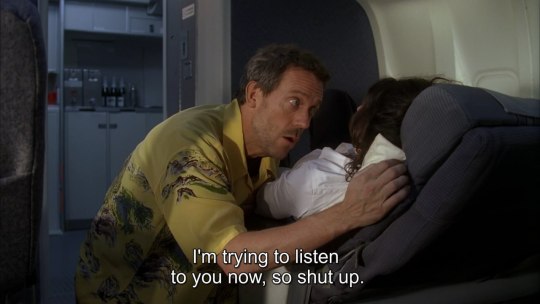
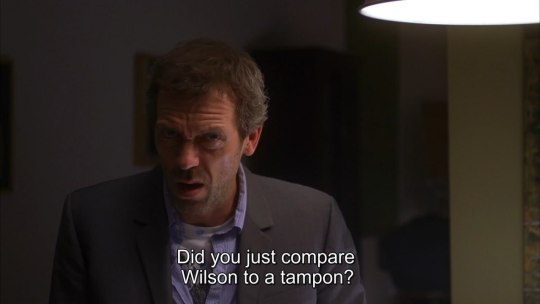
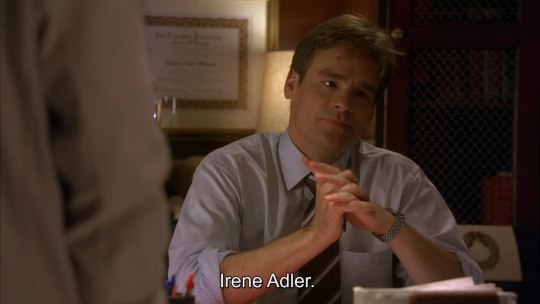
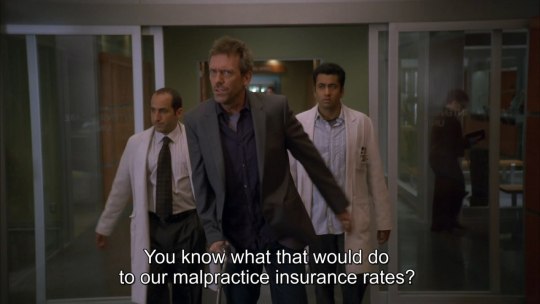
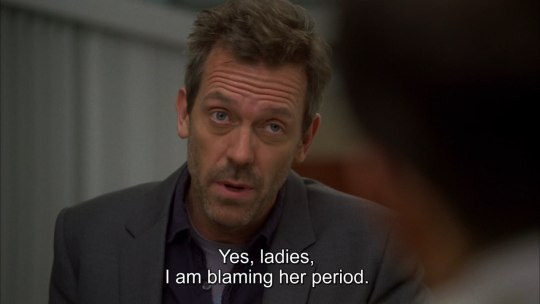
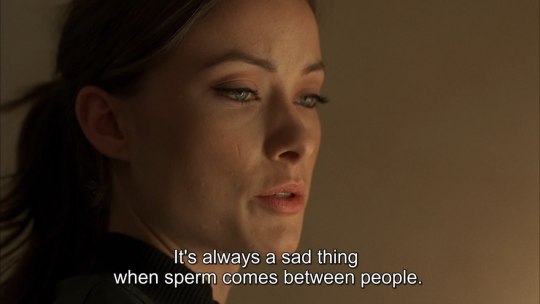
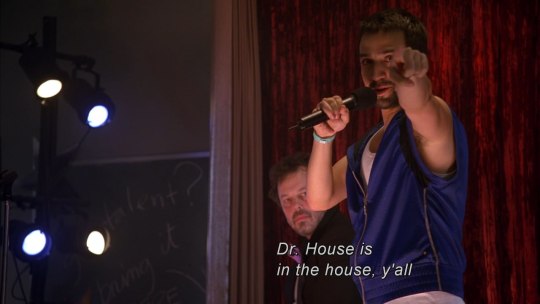
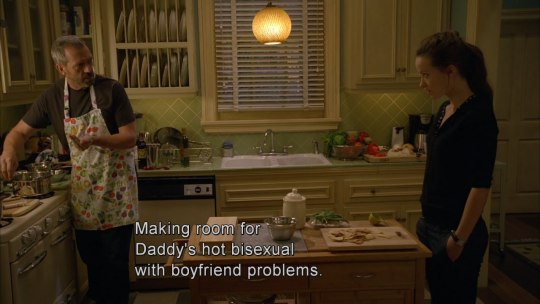
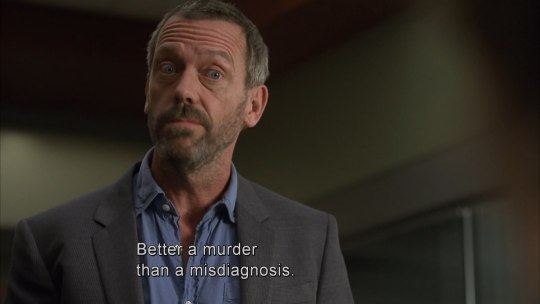
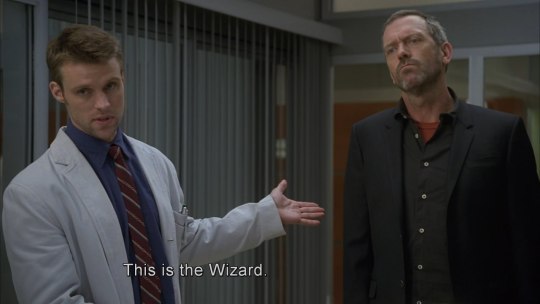
One liners the sequel
#acontextual house#house md#gregory house#james wilson#thirteen#remy hadley#robert chase#“irene adler” fucking killed me first time I heard it#Wilson you're fucking asshole lmao#now did he made up a name or the Sherlock series existence is canon#but ducklings didn't seem to catch on to the reference so its prob random#or was it losely based on someone real who house knew and who did “win” like irene in sherlock did#the fact that this is wilson (watson) telling (making up) us the story of irene is very neat adaptation move to me#is it even adaptation lol. just a reference I guess#anyway#still i laughed at that line#and whats in the porntitle is “Making room for Daddy's hot bisexual with boyfriend problems.”#ridiculous#applies to them both#long post#longpost
2K notes
·
View notes
Note
fab nygmobblepot moments that remind you of kd uwu
OMGGGG AHDAHDUIADHAD
I want to use this moment to be sorry to everyone that follows me but keeps seeing my blog full of Nygmobs/Smaylor instead of kaisoo. I usually don’t get attached to otps like this and it happened in an unexpected way for me. But it’s here and I need to compensate for all the years I didn’t watch Gotham and had no idea about Nygmobs spamming everyone and making my heart warm.
But in general, nygmobblepot isn’t a vision of ideal relationship. Both Edward and Oswald (their surnames Cobblepot and Nygma were the ones who originated this name) are stupid and do stupid shit to each other during most of the series. So, a lot of moments related with the actors counterpart (Robin is the actor who plays Oswald and Cory who plays Ed) reminds me of kaisoo more. But a warning here! Although they have a HUGE chemistry on and off screen, they’re mostly friends. Robin is married for almost ten years so it doesn’t mean their closeness is romantic or sexual. But still, some details remind me of kd.
Similarities with nygmobs:
Height difference: it applies to Smaylor as well because it’s their height but it’s really visible in the series. Cory is a bit taller than JI I think and Robin is like 1.65 but KS is not that taller (I can’t believe he’s 1.73 at all, sorry). But, again, this factor is evident during the series and in some moments and it’s cute.

(the way he moves his feet to reach Ed’s head ;_;)
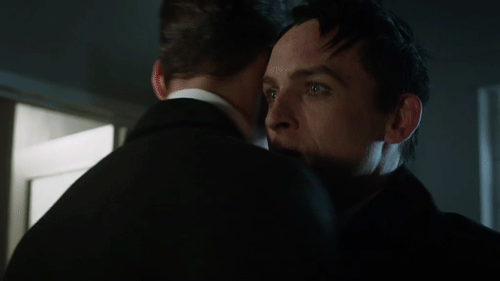
(when they hug, Oswald barely reaches his shoulders [their hugs are the equivalent to kisses in Gotham])

the closest gif I could find where we can see kd’s height difference without me stealing other people’s gifs.
Penguin reference? That’s pretty obvious. Of course I didn’t start shipping nygmobs because one of them is small and has the Penguin nickname but it made so much easier for me to read some of their fics with kd as characters because they fit the profile so much! And also, I believe KD would totally fit the “murder husbands” couple if someone did a fanfic where they just kill everyone. The closest I remember of a fanfic with this criteria is Juice Pouche where Kyungsoo is a vampire and he protects Jongin and Jongin is kind of badass as well. But the kd fandom needs more fics like this. There’s also “(Before the night is over) come see me” where KS is also a vampire and JI a young werewolf but it focuses more on their relationship than a murder husbands idea Gotham shows so well.
How they met: Gotham’s history has a lot of differences if you compare with other universes, so keep that in mind. In Gotham, Ed works with GCPD but doesn’t feel like himself with the good side. Oswald is the character that spices things up and is a rage of death and destruction and manipulation. But Oswald is infatuated with Jim Gordon (so isn’t the first time it’s implied Penguin is gay) but he goes to the police department to see him. Ed sees him and wants to talk to him no matter the cost. And he does that... And things don’t end that friendly for him because Oswald thinks he’s a weirdo and asks him to fuck off, basically. It reminded me of kd’s first meeting where KS was the one admiring JI all along but JI get frightned. But, during their second meeting, they bond and become friends. For Nygmobs it takes more time for their second meeting but they end up developing and being in good terms :’)
Their personas, sort of: Ed is the tall one, younger and logic. Oswald is the oldest, smaller and that thinks with his heart. I love how JI could show the more logic side of himself during the last few years and, again, while reading Nygmobs fics using kd names, it was easy to fit the profile for me (that was during the time I wasn’t too deep into nygmobs and I didn’t knok them that well. KS looks cold and deatached and that’s why many people got impressed when he said, during Knowing Bros that he would choose love over friendship. He doesn’t play the part but, considering all the context, it fits him pretty well and reading this description of Oswald made me so familiar because it fits KD well. Ofc I don’t know their private lives and whatever but it’s just the impression I had as a viewer and random person;
Drama issue: when I say drama here, it’s related with how people percieve the two OTPs and how different people visualize LGBT relationship in media. Nygmobblepot had a lot of drama involved because they’re the fucking Riddler and Penguin, two of the most famous Batman villains. People saw them in different sorts of media before and others idolize those characters because of videogames and comics. So, when Oswald mentioned expressedly that he was in love with Edward, it caused an uproar in the fandom. People accused the producers and Robin of messing with the comic canon because the fucking Penguin became gay??? Robin was outspoken about the homophobia behind those statements since he’s a gay man himself but yeah, the drama existed. Part of the people invovled with the series rooted for Nygmobblepot, including some writers and the actors (Cory was the one with ambiguous messages about the nature of their relationship but it’s not even close what happened with other series like Supergirl, Supernatural and Sherlock). But it was aired by FOX, a right wing channel and, as you may imagine, they didn’t become canon per se. Actually, after Oswald said he was in love with Ed and planned on confessing to him, the writers presented a clone of Ed’s ex girlfriend with no explanation and purpose, only to separate them for most part of the series future. After that, some people seemed to have FORGOTTEN Oswald was once in love with Edward, rationalizing many things that are hard to explain with a “bro explanation”, they had a scene where the characters would have evolved even more but it was CUTTED and CHANGED and execs added the sentence “we’re brothers” to make EXPLICIT that Nygmobblepot’s relationship wouldn’t be interpreted as a romance at the end of the series (but, honestly, the actors went for the romance path anyway, the deleted scenes and the final episode can’t convince me otherwise).
What’s related with KD, may you ask? I think you’re familiar with all the drama KD faced since 2016 and how many stuff exploded during that time. How many parts are involved into creating a certain image and shifting it to be appealing and “friendly” is similar with what happens with idols. It’s no secret now about many scandals of bullying and other issues that are considered problematic and how they need to be pushed under the rug for companies so idols can make money and be profitable. Especially for male idols, it’s important that they are viewed as desirable and an object of the fans affections. That’s why he needs to be handsome and kind and look like a person that doesn’t exist. If an idol is openly gay, this person isn’t viewed by the major public with the same interest because they can’t fit the fantasy. That’s why scandals involving idols being gay need to be forgotten and deleted from people’s minds, otherwise that celebrity is ostracized. Although we tend to see the Ocident as “progressive”, there’s similar things happening in that industry. If a celebrity is openly LGBT, they don’t receive certain roles or opportunities because of it. There’s still a huge stigma that needs to be broken and we, as a society, are so far way from it. But recognizing those differences exist it’s a step forward.
Similarities with Smaylor
For me, one of the reasons Nygmobblepot works so well is because of the actors. They portrait a good chemistry because of their friendship off screen and some non verbal signs they display around each other are amazing. Those are things that remind me more of KD as we see them in a lot of moments. So, I wanted space to show those comparisons below:
Mutual admiration: it’s something both Smaylor and KD display a LOT and is extrememly outspoken. I really love watching their old interviews because the affection and admiration is so genuine it makes me drawn to them despite not being romantically involved.
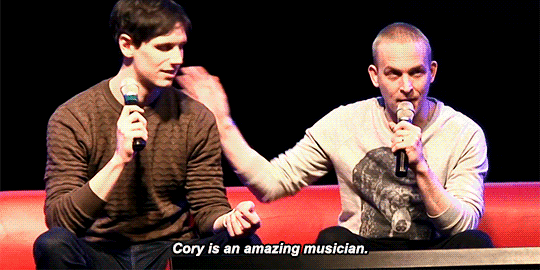
(full gifset)
(there are more moments than these but I don’t want to steal gifs and there’s not much on the gif research and that sucks. Same with KD’s).
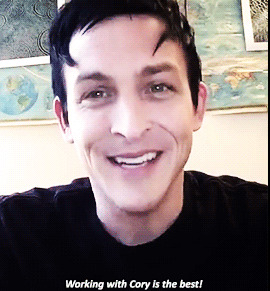
Stares and touches: Robin was the responsible for the deep stares and Cory for the random touches. There’s so many gifs of it that is hilarious. It’s like JI divided himself in two cells because we know he’s more known for both >.<

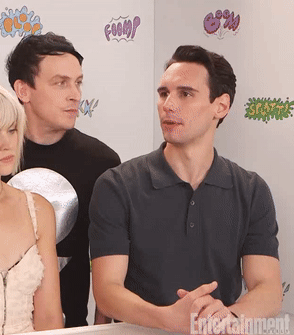


(Cory was touching Robin all the way during this interview rip)

(the gifset!!!)
You’re pretty moment: Robin, like KS, is the one that mentions about Cory/JI’s physical attributes. They have a moment pretty similar and, for KD its famous among shippers:

(gif link)
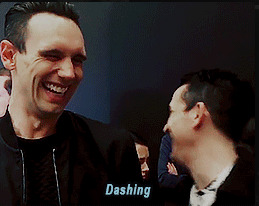
(actually, Robin called Cory dashingly handsome but its okay)
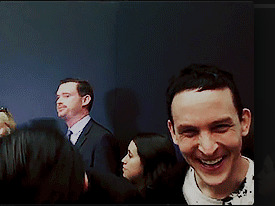
Cory lost it
There’s another series of gifsets with Robin calling Cory handsome LMAOO


:))))
Synchronization: for specialists in body language, it’s a factor that shows two people are close. That’s because of the mirror neurons we have that makes us copy movements, actions or words that someone we have empathy/we are close with do or say. Both kd and smaylor do this and it’s really soft.

(one of the classics)

(classic 2)


whole gifset (i love this interview so much)
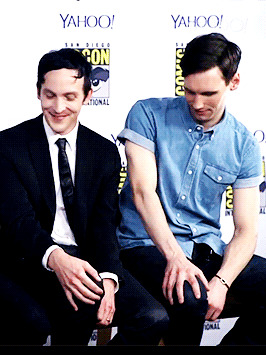
(gif)
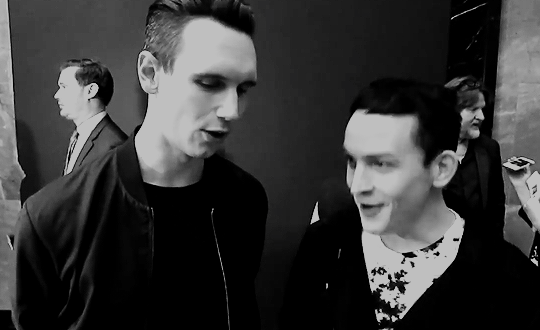
The fact the actors came up with their OTP names: people tend to forget that KD’s real otp name (according with Jongin) is dika. Cory also came up with Nygmobblepot name and Smaylor too <3
So, meanwhile Nygmobs has thropies that work a lot with KD AUs, Smaylor has healthy dynamics seen in public appearances KD made. Like I said above, there’s a huge polemic about shipping Smaylor romantically because Robin is married. On social media, is visible he loves his husband and it’s pretty cute to see. Cory himself mentioned that their relationship was sort of a platonic friendship (whatever that means) but it’s really genuine in terms of affections and display of admiration, something KD has as well.
Probably someone will question that it may changed the way I see KD or if now I ship them as bros. Nothing about that changed. With KD, although there are some similar details, there are internal AND external factors that made me support them in a romantic perspective in the first place. And it didn’t change.
But both of them (Nygmobs too) make me feel that I’m testimoning something genuine, which is really hard in both kpop and media universes. In one side, we have a LOT of fanservice. And, in the other, it’s mostly a work interaction with lots of queerbating. Yes, Gotham has queerbating aspects in it but it’s not full of queerbating, if it makes sense. The message the actors and some writers wanted to convey are there and really display a romantic direction with character evolution and growth. And, considering the way media is nowadays, it’s nice to see.
31 notes
·
View notes
Note
writing question: how do you structure each arc esp in terms of the grand story? i’ve tried to write big fics before but despite my dramatic plans for the beginning and end, i only have overarching ideas for in between with no clue abt the nitty gritty. how do you turn “x should develop across the story”, “y should be foreshadowed early on” etc. into a proper series of events?
BIG SPOILERS FOR HKU UNDER THE CUT
Ok so first, pretend you are writing the shortest fic in existence. That way, you lay out ONLY the most essential features of your main plot.
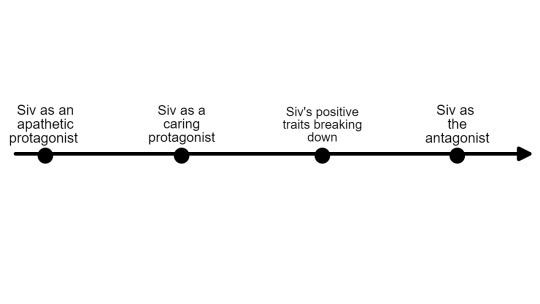
Then lay out ONLY the essential details that connect these important plot points
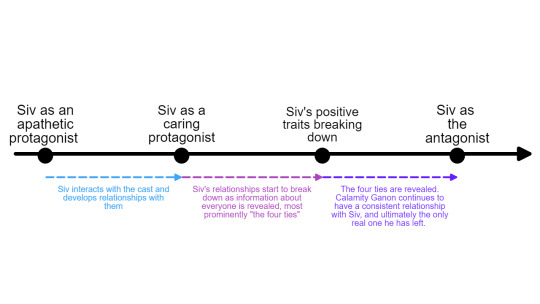
That’s pretty much the basics of what you need to figure out before you start anything else. If you don't have that figured out yet, work on that before anything else.
So the inbetween stuff is basically how you keep the audience intrigued between these parts of the story. You can use different plot points or "twists" to create a system of highs and lows, like a wave. That way, the story is dynamic, people are interest, and it's not boring.
It’s not about being unpredictable, but you just gotta go through trial and error with finding out where to place what details when, so that you can have adequate pay off.
Generally the rule of thumb is, the bigger the ultimate reveal, the earlier on you should lay clues and foreshadowing. Obviously try not to do it to a point where it’s too obvious, as the tool of a plot twist is mainly to get the reaction of “I SHOULD have seen that coming, but I didn’t!” instead of “I would NEVER have seen that coming!”
If you got all that, just place it in your brain for later as we add more to our little diagram.
So let’s structure where we place our “plot twists” and important beats. These have to be essential to connect your bigger plot, or developing one of your character, otherwise they’re just useless and you should cut it. I’m gonna start with the stuff that affects the plot. (Again, trying to be as simplistic as possible.)
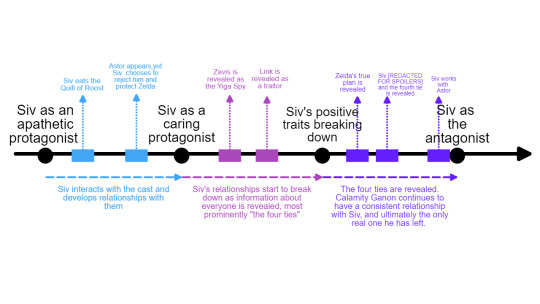
So these beats in the story are essential to connect the main plot points, if you take them out, it doesn’t make sense. The specific cosequences for these “plot twist” are the connective glue that you wrote down earlier. For example, the consequence of Siv protecting Zelda is him solidifying his trust and love for her in that moment, thus his relationship with her develops him into a caring protagonist. The consequence of Zavis being revealed as a spy is Siv starting to question the relationships he’s made, and they start to break down over time. The consequence of the fourth tie being revealed is that it leaves the only intact and ultimately consistent relationship in Siv’s life to be Calamity canon.
Also you might notice that I redaced one of the plot twists for spoilers. BUT, I think this is a good moment to point out that you don’t necessarily need to reveal the information that your characters learn as they happen, because I think setting up forshadowing for the twist itself AFTER it happens can be pretty interesting. The reader knows that something has happened, but now the mystery of exactly WHAT it was can drive the plot further. Anyways.
You have these point, and now you have to figure out what to put inbetween. Again, you have to create highs and lows, and general your twists are your highs (points of extreme action and tension for the reader), so now we establish your lows (points of comedic relief and relaxation for the reader).
But, SURPRISE! You already did that! Your lows of the story are determined by the areas inbetween your plot twists!
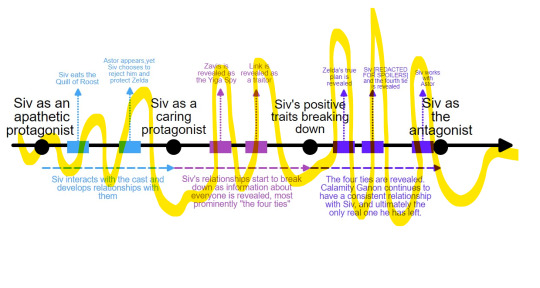
Now if you don't like where your highs and lows are, that's alright, you can move stuff around, again it's a process of trial and error. But the name of the game is pacing, but that's like a WHOOOOOLE OTHER essay about how to pace things, but we're here for deciding where to put arcs so we'll just breeze by that right now.
You also might notice in my badly drawn diagram that the height of the crests of each wave are different, and you'd be right to notice that. It's because I'm assigning a sort of "value" of each plot twist, as as the writer I know how important the impact of wave one is. Generally the rule is the further along you go, the more value ro tension a point has to offer. It'll kinda look like those five act structure graphs your english teacher showed you in fifth grade.
So now FINALLY, you can get a general sense of where to have arcs in your story.
Not every arc is gonna be the same, that's just a given, but you can get a general sense of where certain arcs are based on what you made.
Maybe if you're going for a lighthearted tone, you want every arc to start on a low, and end on a low, like an episodic format. Or maybe if you're going for a tone that's more serious or myserious, you'll be more prone to end arcs on highs. You can problem guess which one I lean more towards.
Quill Boys and co arc: Start on the low of Siv and Zavis hanging out, being pals, end on the high of Zavis' reveal as the spy
A lark flies into the woods arc: low action as Siv and Astor talk, the high of Larc's decision is revealed.
Hollow knight but not that hollow knight arc: The tension continues to rise in the battle, and then a low after the battle is won, but then the high of Link's truth is revealed.
That's how I write my arcs, but sometimes depending on where I want the tone to be, I'm stretch out multiple low-high-low arcs to give the reader a break. But you'll notice as we approach closer and closer to the climax, the frequences of the waves increases, and the length of the breaks decrease. So when that happens, you might need to break your arcs in highs and lows that art part of a bigger wave, similar to how i did #a lark flies into the woods and #Hollow knight but not that hollow knight.
For another example of breaking up arcs to show part of a wave, I did #sibling fights hollow knights and destiny rewrites and #long ago and long away, with the "high" of Zelda's plan being what splits them down the middle.
AGAIN. THIS IS ALL TRIAL AND ERROR AND WILL NOT WORK FOR EVERY TYPE OF STORY. THIS WORKS FOR ME BECAUSE MY STORY IS BASED ON THE IDEA OF UNSEEN INFORMATION AND ULTIMATELY BEING "UPDATED" ABOUT IT, SO THE REVEAL OF INFORMATION PROVIDES A CONCLUSION TO AN ARC
BUT JUST ENDING AN ARC WITH A PLOT TWIST DOES NOT AUTOMATICALLY MAKE IT GOOD. TRUST ME I'VE MADE THAT MISTAKE SOMETIMES [BUT I AM ALSO STARING INTENTLY AT TV SHOWS LIKE SHERLOCK AND LIKE 60% OF DISNEY]
Now, on that final point about foreshadowing. Let's look at those values again?

So, the more impactful you see your plot twist or development, the earlier you should set it up (generally, anyways. there are exceptions)
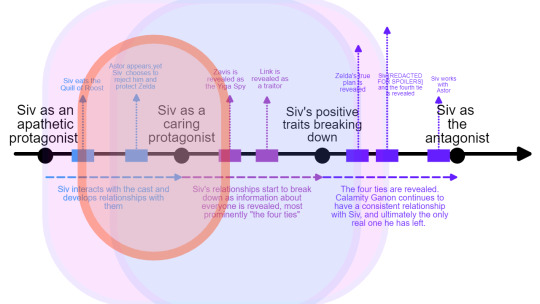
This is an example for the Zavis, Zelda, and Fourth Tie twists. I value the fourth tie as the highest, so I establish it subtly very early. I also value Zelda's plan as pretty high, so I establish Terrako pretty early, and her reveal gives an explanation as to why she's so focus on fixing Terrako, and also explains her reaction to Zavis' reveal. Zavi's twist is important, to who he is, so I set him up right by his first introduction
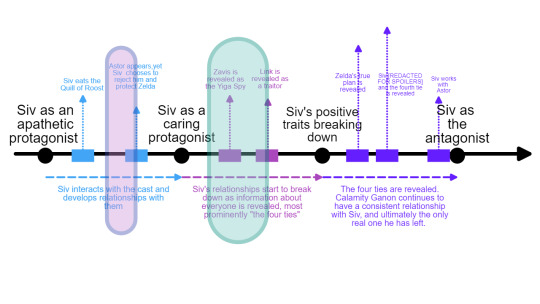
Link's twist is important, but I personally wouldn't value the tension and high of it as much as Zavis'. In addition, I already have a long establish plot twist revealed with Zavis, so I think I want to surprise my audience a bit more by foreshadowing Link's tie only a few arcs before the reveal. Astor's impact is almost better if there's nearly no foreshadowing to him at all, (especially on a meta level) so I think I'll make one off hand mention to him existing and leave it at that.
I think for the most part, the more impact the event has on the development of your story/character, the earlier on you should foreshadow/hint at it.
And I breezed by a lot of shit, like I didn't even TOUCH the character related twists like Sooga and Revali. And there's shit about pacing and timing and conclusions and beginning to arcs and their relations...but I think that's a good enough starting point for your ask.
So keep your arcs dynamic do follow the highs and lows of your story. Make sure they end conclusively (cliff hangers are ok, but don't assume a plot twist in of itself is a conclusion) and foreshadow shit earlier depending on how big of a twist it is
18 notes
·
View notes
Photo
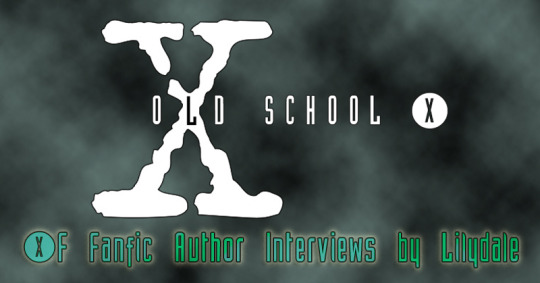
Old School X is a project interviewing X-Files fanfic authors who were posting fic during the original run of the show. New interviews are posted every Tuesday.
Interview with Sophia Jirafe
Seven of Sophia Jirafe’s fics are at Gossamer, but more of her X-Files stories are at AO3 (as sophiahelix). I’ve recced some of my favorites of her stories here before, including Stones and Bones. She was active in the fandom during the show’s run and has never strayed far from fandom in general. She co-founded Glass Onion, a great multi-fandom mailing list that now has nearly 1,000 fics from 100 fandoms at AO3. Big thanks to Sophia Jirafe for doing this interview.
Does it surprise you that people are still interested in reading your X-Files fanfics and others that were posted during the original run of the show (1993-2002)?
It did initially, but so many old shows are on streaming now and getting discovered by new people, it makes sense.
I did get a comment from someone who said my first story under this name, posted in early 2000 when I was a college freshman, was older than her by a couple of months, and THAT took me aback.
What do you think of when you think about your X-Files fandom experience? What did you take away from it?
It was my first fandom, discovered when I was 17 and searching for info about the show on the school library computer, and it really shaped my whole life! I met a lot of people I still know today (mostly in non-fannish venues like FB, though I do still have some connections in fandom), and learned a lot about writing and just life generally, since I was younger than most of fandom at the time.
Social media didn't really exist during the show's original run. How were you most involved with the X-Files online (atxc, message board, email mailing list, etc.)?
I started off on a tiny forum at a website called Squirrel’s Nest, but I kept seeing people thanking Scullyfic in fic headers and eventually I was able to join the mailing list (which was capped to 500 members). Scullyfic was everything to me — I made friends, betas, discussed the show, learned about all kinds of things on Off-Topic Fridays, etc. A lot of those friends, I would email with or more often chat on AIM (individual or these sprawling group chats that would go on all day), and then at the end of 2001 we started migrating to Livejournal. I was getting into Buffy more by then, but it was still mostly the same crowd of people I knew from Scullyfic.
What did you take away from your experience with X-Files fic or with the fandom in general?
I feel like it started me on a whole life path really — finding that my deep obsession with fiction could be channeled like that and shared with other people, as well as deepening my writing. Online fandom has been a major part of my social life for over 20 years now, and I love the mix of getting excited about things with friends and also the creative outlet.
My corner of X-Files fandom in particular was just very calm and enjoyable for the most part, full of older professional women who were happy to be friends and give me advice about all kinds of things, and it really set the bar for me with my online interactions. Now I’m almost 40 and trying to be that person for my younger friends, as well as having no patience for toxicity and in-fighting in my fandom spaces.
What was it that got you hooked on the X-Files as a show?
A combination of the creepy conspiracy angle and just adoring Scully. I remember how mysterious and fascinating the show seemed when I discovered it right before S5, and there was no way to find out more except to keep watching and hoping they explained. Scully was so smart and tough and beautiful and interesting, and as a teen I was just captivated by her (and the UST, though I didn’t care about Mulder as much).
What got you involved with X-Files fanfic?
I ran across it a couple times early on but felt embarrassed by the concept, but then I read the first in Karen Rasch’s Words series and suddenly it clicked for me. After a while I started daydreaming my own conversations between them, very similar to what happens to me now when I’m getting into a new pairing, so after reading tons of recommended fic by big authors, I started writing my own (the 3-4 stories I posted in high school are all wiped from the internet now, though).
What is your relationship like now to X-Files fandom?
Good memories, though because it was my senior year of high school and college, I know a lot of it is just tied to that time in my life, and also being in my very first fandom. I will rewatch episodes from time to time, but I basically never revisit former fandoms because they’re kind of like exes, even if I finished on a good note. I also think my taste in fic has changed (and there isn’t the same novelty of “characters I like getting together omg!”)
Were you involved with any fandoms after the X-Files? If so, what was it like compared to X-Files?
So many! None of them had quite the same combination of excellent central architecture (especially pre-AO3) and a really high level of discussion and friendliness without being enormous, but I’ve loved them all in their own ways. I’ve done fandom on LJ/DW, Tumblr, Discord, and now on Twitter, and I think I miss the mailing list days the most. You didn’t have to repeat yourself so much in multiple conversations, you weren’t character limited, and the discussion was all in one place, with personal stuff more confined to your side conversations. Discord is a little like that, but it moves too fast and there’s too much noise for my taste.
Who are some of your favorite fictional characters? Why?
Heh, after X-Files I went through a whole phase of faves in the Scully vein — Buffy, Aeryn Sun, Kara Thrace, etc. Like many people I’ve shifted primarily into m/m in the last decade (Sherlock, YOI, and recently The Untamed have been my major fictional fandoms, along with a lot of sports RPF), but for non-fannish shows I’m always looking for awesome new female characters, like Elizabeth on the Americans, Peggy on Mad Men, Nadja on What We Do in the Shadows, etc. And I do LOVE Killing Eve and have written a little f/f over there.
Do you ever still watch The X-Files or think about Mulder and Scully?
I’ll rewatch favorite episodes occasionally, and I keep thinking about a full rewatch but it takes so much time! I never saw the second movie, and I didn’t finish the first of the new seasons because I was hating it, so it’s a little hard for me to think fannishly about them when I disliked basically everything after “Je Souhaite” so much (as far as I’m concerned the show ends there).
Do you ever still read X-Files fic? Fic in another fandom?
X-Files no, but yeah I’m still very active in fandoms.
Do you have any favorite X-Files fanfic stories or authors?
I lost all my saved fic several computers ago, but I recall loving “Blue Christmas” by Plausible Deniability and “Diamonds and Rust” by MustangSally (obviously everything she wrote was great).
What is your favorite of your own fics, X-Files and/or otherwise?
Looking at my X-Files fic, I can’t believe how short it is and how comparatively little of it there is (I have lost track of a few ficlets). It felt like such a big deal to finish anything back then! I think my favorite remains Alphabetum, which involved a tricky structure and 5 elements given by people as part of the Scullyfic Improv challenge, where you had a week to write a story around those elements.
My favorite of my recent fic in fictional fandoms is probably the GoT/YOI crossover novel I wrote a couple years ago, for a completely opposite experience to this (and proof you can grow as a writer with a lot of effort!)
Do you think you'll ever write another X-Files story? Or dust off and post an oldie that for whatever reason never made it online?
It’s honestly hard to imagine going back (like I said, I usually don’t), but I guess I could get inspired by something.
Do you still write fic now? Or other creative work?
I certainly still write, and I do have to give credit to XF fandom and Scullyfic in particular for giving me the start I got, where I really wanted to be writing good fiction. The few things I wrote in high school were just me jamming out romantic cliches, but the people I was lucky to know in XF fandom showed me that “just” fanfic can still aspire to be high quality. I am a much, much better and more disciplined writer than I was back then, but I might never have started on this path without fandom friends encouraging me.
Where do you get ideas for stories?
Usually just daydreaming about emotional dynamics between characters/people, but sometimes something specific in canon or real life (I write a lot of RPF) gets me going, or maybe something I read.
What's the story behind your pen name?
When I wrote for X-Files, I picked “Sophia Jirafe” combining my favorite first name with a fancy spelling for my favorite animal (I was 18! Don’t judge!) Over on Livejournal, my friend Jintian and I initially shared an account with the same name as our website, double_helix, and when she got her own account I changed to sophia_helix, which is now sophiahelix just about everywhere. A little clunky, but I like the continuity (and I do run across old friends who remember the name).
Do your friends and family know about your fic and, if so, what have been their reactions?
The friends I’ve known for a very long time know about it, but we have never talked about it in depth. My husband, who I met not long after getting into fandom, also knows about it, and he’s encouraging and also a writer so we talk all the time. I told my mom in college and she was pretty dismissive, so we haven’t talked about it since (but my younger sister knows and is cool about it).
When I was younger, it was something I shared readily (I bonded with a new friend in law school I saw looking at LJ), but now I don’t really bring it up with new acquaintances.
Is there a place online (tumblr, twitter, AO3, etc.) where people can find you and/or your stories now?
I just made a Carrd the other day with all my various fannish addresses (Twitter, locked fannish Twitter, AO3, Tumblr)
Is there anything else you'd like to share with fans of X-Files fic?
Just that it really was a high quality fandom — so much excellent long casefic, so many cool down to earth people, just generally a great launching place for a young fan. The friendships I made with older people were really important to me, and it makes me sad to see a lot of younger people now getting upset about the idea of anyone over a certain age being in their fandom spaces. I hope someday fandom can get back to appreciating that people of all ages can be the fandom type, and that everyone brings something different to the community.
(Posted by Lilydale on December 1, 2020)
42 notes
·
View notes
Text
Chapter 5 – Hey, Soul Sister: Who is Eurus?
Do you get it? She’s his sister? But metaphorically, she’s a part of his soul? I was very impressed with myself for this title. Anyway…
This chapter of the meta is going to deal with the various times we meet Eurus before TFP and what this might mean, which will help us to understand who she is once we have stripped off the disguises.
Before series 4, we had real!characters and MP!characters set up as distinct entities, particularly in TSoT, which distinguishes between MP!Mycroft (the deducing brain) and real!Mycroft, as well as MP!Irene representing desire and real!Irene, who doesn’t come near the episode. The MP section in TSoT, for a lot of people in the fandom, broke down Sherlock’s psyche into MP!John vs. MP!Mycroft – and John is clearly winning.
However, I want to suggest that Sherlock’s psyche isn’t nearly so straightforward as a tug of war between the brain and the heart. Whilst MP!Mycroft undoubtedly represents the oppressively reasonable part of Sherlock’s psyche, that’s not the only thing repressing him – it can’t be. If it were simply a rejection of ‘sentiment’, this wouldn’t be the powerful queer love story we know it to be – there is a lot more internalised homophobia being dealt with than just love being illogical. That’s where Eurus comes in.
Eurus and Mycroft are parallel oppressive forces in Sherlock’s brain, but they’re oppressive in different ways. Having family members and childhood trauma be the psyche’s symbols for repression is particularly poignant in a queer love story, for obvious reasons. However, I want to take you through my reasoning behind Eurus being the most secret and troubled part of Sherlock’s soul.
The first clue is that her prison is called Sherrinford. We all assumed that the third Holmes sibling was going to be Sherrinford back before s4, and it seemed that way in the beginning, with Mycroft mentioning speaking to Sherrinford several times, construing it as a person rather than a place. This is no coincidence – for those who aren’t familiar with the history of the stories, Conan Doyle’s original name for his protagonist was Sherrinford Holmes, which he later changed to Sherlock. That Eurus is trapped inside Sherrinford is a clear suggestion that Eurus is something that’s trapped inside Sherlock – a dangerous MP entity. More important than that, Sherrinford is the version of Holmes that never made it into the books. Plenty of people have worked on queering the Holmes canon and working out what ACD might have been implying and leaving out and arguably none more so in an adaptation that Mofftiss. Let’s think about the implications of this. A kind of second self, not shown to the public, buried inside your mind and forgotten since childhood, which is bursting out into a moment of acute psychological distress. Gee, I don’t know what that could be about. The Sherlock that Sherlock thinks he is has thus far been dominated by MP!Mycroft, but this series is about uniting canon!Holmes with the non-canon, queer Sherrinford who has always existed, judging by the name, and who is currently dominated by the destructive MP!Eurus. The other important point to note here is that Sherrinford is an island in the middle of the sea – that’s not a coincidence, given how much water imagery abounds in this series. I spoke briefly in Chapter 2 X about how water represents Sherlock sinking deeper and deeper into his own subconsciousness – this is the deepest he can go. In Greek mythology, Eurus was the name of the wind most associated with causing storms at sea X – this isn’t a coincidence either. She’s very deliberately tied in with water.
(In real life terms, of course, all this means that a real!Eurus probably does or did exist in some form, although I can’t begin to hazard a guess about this. However, I’m trying to refer to her as MP!Eurus when she’s in her normal form in the MP, in case we get a series 5 with Sian Brooke as real!Eurus, and also to distinguish her from therapist!Eurus etc.)
This is my reasoning as to why MP!Eurus represents Sherlock’s innermost trauma. She is not merely the fact that he loves John – he deduced this in TSoT without her appearance. She is the trauma that he needs to come to terms with. A running theme through our analysis of Eurus will be that her gender is particularly important; her representation of Sherlock’s repression cannot be but as a woman, because for most of s4 he is only able to process his identity through the most heterosexual of lenses. We see this hinted at quite early on in TST, when Sherlock takes on a case called ‘The Duplicate Man’, warning John that it is never twins. The word ‘duplicate’ here, removing twins, leaves us with the only real possibility that it is in fact the same person. Eurus’s gender makes that more difficult to see; she needs to be female, but it’s much more difficult to elide the two characters without employing a Cumberbatch doppelganger. However, this hint that Eurus is not only male but an actual ‘duplicate’ of her brother should give us pause for thought. With this in mind, I want to use the rest of this chapter to analyse her three forms before TFP.
1.) Faith!Eurus

I’m certainly not the first to point out that Faith!Eurus is a mirror for John, nor will I be the last – people jumped on it pretty much as soon as TLD aired. There are a few good reasons for this. Firstly, she walks with a cane, a throwback to ASiP – in case we’d forgotten, however, Sherlock has a flashback to John walking with a cane to make the link explicit. We are supposed to link these two characters, the authors are saying pretty clearly. Faith!Eurus is also suicidal, which John was at the start of ASiP, as made clear by the fact he carried a gun – and Faith!Eurus does the same. Sherlock also takes her out for food (for more on the food/sex metaphor, see here X) which he doesn’t with anyone bar John, and we certainly never see him talk so easily with someone who isn’t John. An eagle-eyed tumblr post that I can’t find now also broke my heart in pointing out that Faith!Eurus’s unseen self-harm matches long-sleeved John Watson a little too well.
This isn’t just the show trying to remind us of what John was like in ASiP, however. MP!Eurus is the trauma prodding Sherlock’s sexuality – it’s going to be hell to get through it, but he absolutely needs to do it. This is Sherlock’s trauma, not reminding him that John was suicidal, but forcing him to acknowledge it in the first place, something which Sherlock has buried. We know this because of the way the image of John forces its way into Sherlock’s mind – it’s much like the way Moriarty breaks into TAB. His brain is making a connection that he’s not quite capable of making and it’s knocking him. His deduction that Faith!Eurus is suicidal is accompanied by that image of John, and he then re-enacts the food ritual he completed with John the evening John left his cane behind, before throwing Faith!Eurus’s gun into the Thames – proving that it was Sherlock himself who stopped John from taking his own life.
This is trauma, however, and Sherlock can’t process it in full – hence why the image of John that breaks in is shaky, and Sherlock tries to push it out of his head. It’s also why Faith!Eurus, who in Sherlock’s subconscious could take any form, specifically takes the form of a woman. His gay trauma means that he first has to process John’s suicidal ideation in a heterosexual dynamic, before fully grasping and applying it to his relationship with John. (Chapter 9 X explains how that plays out over the rest of TLD in full detail.)
2.) E!Eurus

Taking a jump back to surface level plot here, the first thing that grabbed me about E!Eurus was just how minor John’s flirtation with her was. In the terms of a television show which really rides on very high drama (multiple faked deaths and insane cliffhangers for a start), the emotional peak of John’s emotional arc with Mary being that he texted another woman – not went out for lunch, not kissed, not slept with – is bizarre, particularly when we know next to nothing about E!Eurus at this point. It’s incredibly anti-climactic as a means of John falling short of Mary’s view of him. Maybe we can accept it as in line with John Moral-Principles Watson, but it’s difficult to accept as in keeping with the nature of a show whose intent is nearly always to shock.
With this in mind, let’s delve back into the MP to see how that might give this moment greater emotional significance. Chapter 10 X is on the hug scene, and that will deal with John’s revelation of his infidelity in greater detail. For the moment, the most important thing to remember is that John Watson is not real!John – he is heart!John. In other words, we are seeing a similarly heterosexualised re-enactment of Sherlock’s relationship with John.
I will talk a lot in Chapter 10 X about how MP!Mary is linked to Sherlock’s compulsory heterosexuality; at the end of TST, Sherlock substitutes Mary’s body for his because he cannot conceive of John’s queer grief without breaking himself. This is interesting because the E of Eurus actually stands for Elizabeth in this scene (certainly in the credits, and possibly elsewhere, although I can’t remember Sian Brooke actually saying it). Elizabeth is Elizabeth is Mary’s middle name in BBC Sherlock, which looks like another of those shared name links our creators love so well. If so, this begins to justify how Sherlock’s heart is conceiving of its emotions. We will see in TLD that heart!John’s relationship with fem!John in the form of Eurus is aligned with Sherlock’s sexual desire in the form of MP!Irene. Both are hidden and exist only in texts – i.e., they cannot be spoken yet. But they will be.
3.) Therapist!Eurus
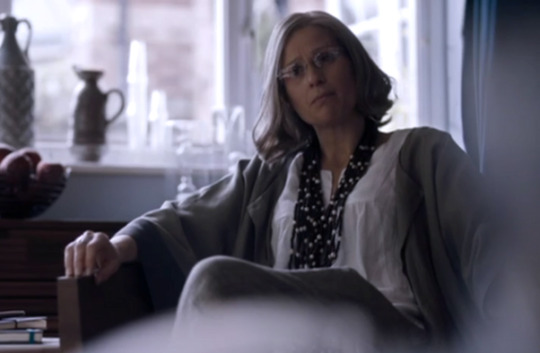
This one is perhaps the most straightforward on a symbolism level, but also possibly the most significant moment in the series. Therapist!Eurus, plain and simple, is Sherlock’s trauma prodding at John, interrogating him like a therapist would, trying to work him out – and largely failing, right? She can get basically nothing about how he feels about Sherlock out of him. But this is part of MP!Eurus’s ongoing project to get Sherlock to wake up – the Gay Trauma is interrogating John, trying to suss him, and failing.
Except, in the final scene of TLD, without the help of Therapist!Eurus, Sherlock has finally sussed John – it has taken until Culverton’s confession to recognise that John is suicidal without Sherlock (Chapter 9 X). The sigh of relief that is the hug scene (Chapter 10 X) is a kind of acknowledgement of that relief that he’s finally worked out what he’s been trying to cover up with drugs – so much so, that he misses the obvious, which is that John is suicidal again. When John leaves his cane with Sherlock in the hospital, it is a reminder of the first time he is suicidal, and Sherlock doesn’t make the immediate leap in his comatose haze that this is what his psyche has been trying to tell him. Hence you have this moment of immense relief and fade out at the end of the hug scene which suggests the end of the episode, and could feasibly end Sherlock’s life, except we’re started awake with a much more abrupt and troubling ending scene – Therapist!Eurus shooting John. Because, of course, if Sherlock is gone again, John must be suicidal again, and it has taken a few scenes of cognitive dissonance for this to clock. Indeed, it’s not Sherlock himself who clocks – Gay Trauma in the form of Eurus!Therapist returns and shoots John for us. This shooting isn’t, of course, permanent (in one of the worst cliffhanger resolutions in TV history), but that’s because it’s not real – it hasn’t happened yet. It is Sherlock, through MP!Eurus, finally recognising the problem – John.
This is particularly poignant in light of the opening and closing shots of TLD. Although there’s the fucky not-blood red that fills the screen at the end of TLD, apart from that the shots of Norbury shooting Mary and Therapist!Eurus shooting John are one and the same shot. It’s also a stylish shot (what I call split screen, but given that I never went to film school I think that’s just my name for it) and it’s repeated enough times over TLD that it’s pretty clear the creatives want it to be memorable. By the time John gets shot, then, we shouldn’t be caught up in the drama of it – we should be thinking, as so many did, “something’s fucky.”
And it is – but it’s brilliantly fucky! Head over to Chapter 7 X if you want to read about Norbury shooting Mary, but TLDR it’s a metaphor for Mary shooting Sherlock as understood from Sherlock’s warped and depressed perspective – and he’s finally realised what it means! The version in which Mary shooting Sherlock means John losing Mary (the Norbury version) is one in which John is sad, goes to therapy, and the world moves on. Now, however, that Sherlock has recognised that John was suicidal, he can also recognise that Mary shooting Sherlock will make John suicidal again – hence why it’s the same shot. Mary shooting Sherlock is the same as John dying – and the latter is much more important in Sherlock’s mind.
[It’s worth noting that the identical shots we see in TST and TLD don’t match the shot in HLV, although admittedly that one’s not in the MP – it does strike me, however, that the sounds are reversed – HLV sounds like a dart, whereas the MP shots sound like bullets. If anyone has any thoughts on that, do let me know – it has me flummoxed for the moment. If you want meta explaining why the shot from TST is the same as HLV, Chapter 7 is here X, and I’m certainly not the first to hypothesise this. For me, the TLD shot being the same is therefore a logical extension.]
#tjlc#chapter five: hey soul sister - who is eurus?#eurus holmes#meta#my meta#mine#bbc sherlock#johnlock#tjlc is real#bbc johnlock#e#mary#queer theory
30 notes
·
View notes
Text
From Lupin III to Inspector Gadget: Examining the Heirs of Arsène Lupin
https://ift.tt/3p5oPe7
This piece contains spoilers for Netflix’s Lupin.
As Arsène Lupin, the gentleman thief created by Maurice Leblanc in 1905, is a renowned master of disguise, it is fitting that he has inspired a number of literary characters to take up his mantle. Arguably the most recognizable riff is Lupin III, a copyright-infringing, quasi-canonical descendant by way of Japanese manga and anime. Yet it wasn’t until Netflix’s new French mystery comedy-drama series Lupin—which reinvented the source material through Omar Sy’s Lupin and the lenses of immigration, racism, and fandom—that readers and viewers have truly been challenged to consider what it means to inherit, whether through blood or through books, an iconic character’s legacy. Consider this a field guide to the many different Arsène Lupins.
What is immediately intriguing about both Lupins is that neither is as white as the top-hatted, monocled thief that Leblanc created over a century ago. Assane Diop (Sy), the charismatic lead of George Kay’s Lupin, is a Senegalese immigrant whose father Babakar (Fargass Assandé) brought him to Paris for a better life. The lethal mix of elitism and systemic racism that they encounter via Babakar’s employers, the Pellegrini family, are what shape young Assane’s life into a revenge narrative, but also become tools in his career as a gentleman thief. Yet even Lupin III, created in 1967 by manga artist Monkey Punch (a.k.a. Kazuhito Katō), is introduced as the French-Japanese grandson of Leblanc’s Arsène Lupin. In the Lupin the Third Part II episode “The Southern Cross Looked Like Diamonds,” which concerns Japanese casualties of the Pacific War, Lupin discusses his dual heritage. Both adaptations add texture to their Lupins’ stories by not allowing them to move through society quite as smoothly as the original French thief.
That said, Monkey Punch’s Lupin III certainly benefits from a fair amount of family legacy by carrying on his grandfather’s and father’s reputation as a world-renowned thief, marksman, master of disguise, womanizer—you name it. He’s almost more of a reincarnation of the original than a descendant, with the only real change being the shift in period from the early 20th century to the swingin’ sixties. Monkey Punch also drew from Lupin III’s contemporary James Bond to enhance some of those darker and more adult aspects in the manga, while basing Lupin’s on-again, off-again romance with bombshell spy Fujiko Mine on D’Artagnan and Milady de Winter’s relationship from Alexandre Dumas’ The Three Musketeers.
According to a 1995 issue of Manga Mania, Monkey Punch had initially considered keeping the blood connection a bit more under wraps, having not obtained the legal rights from Leblanc’s estate, but was convinced to embrace the Arsène Lupin connections. While Monkey Punch’s adoption of the Lupin persona wasn’t kosher by copyright standards, it was also very much in the spirit of the character—asking for forgiveness rather than permission—as well as the creator himself: Leblanc borrowed Sherlock Holmes for a few Lupin adventures before Sir Arthur Conan Doyle realized, and only then changed the detective’s name to “Herlock Sholmes” for subsequent showdowns. Still, it did eventually backfire for him, though it also led to, fascinatingly, beloved animated character Inspector Gadget (more on that later).
Read more
TV
Lupin Part 2: 2021 Release Confirmed by Netflix
By Kirsten Howard
Perhaps the most beloved iteration of Lupin III is in Hayao Miyazaki’s 1979 film The Castle of Cagliostro. Monkey Punch’s manga cast Lupin III as a rather unsympathetic master thief: callous about his victims, a caddish ladies’ man who often harassed women he saw as little more than sex objects. While the anime quickly established a moral code—stealing from rich people who either deserved it or would not overly suffer for it—it was Miyazaki’s film that gave Lupin III real heart. In rescuing princess bride Clarisse from a Gothic marriage, he displays a surprising sense of chivalry, especially when the plucky girl wants to be his sidekick. Lupin’s silent agony over turning her down lends the otherwise carefree heist film a shocking touch of melancholy, and lays the groundwork for a more well-rounded Lupin III in future outings.
The Lupin III bloodline has extended several generations into the future, though none of these descendants made much of an impact beyond their respective adventures. First there was Lupin III Jr. (yes, that’s his name), the son of Lupin III and Fujiko, who only ever existed in the manga. Elusiveness of the Fog, the nineteenth Lupin III TV special, uses a time machine to jump ahead to 2883 and glimpse Lupin XXXIII, a.k.a. Lupin the 33rd, identical to his green-jacketed ancestor. He gets three whole lines and mostly seems like an excuse to show that thirty generations later, little about the iconic thief has changed.
In between those two there was Lupin the Eighth, would-be star of a 1982 spinoff created in collaboration between Lupin III studio TMS Entertainment and French-American studio DiC Entertainment. The Lupin VIII series would have jumped a conservative five generations ahead, with the familiar crew’s great-great-great-great-great-grandchildren carrying on the same names, traits, and rivalries and romantic entanglements. But when the Leblanc estate got wind of this Japanese/French collaboration showing up on their continent, they put the kibosh on the project; only the pilot was animated, and was shut down before vocals had been recorded.
Because TMS and DiC had already lost their investment, they scrambled to come up with a replacement for the timeslot. And so Inspector Gadget was created, with the trenchcoat-clad cyborg bumbling his way into viewers’ hearts. Despite his complete lack of suaveness compared to any version of Lupin, you could say that, in terms of staying power, Gadget was Lupin III’s true successor.
Yet while Lupin III had every familial and financial resource at his disposal to continue his grandfather’s and father’s work, everything Assane Diop needs to know he learns from a book. The Arsène Lupin books, which Babakar gifts him right before he is framed for stealing the priceless Queen’s Necklace from the Pellegrinis. Babakar’s arrest, guilty plea, and prison suicide leave Assane burdened with a strange inheritance of misfortune, words, and blood money—as Madame Pellegrini (Nicole Garcia) pays for fancy schooling he otherwise would not have been able to afford. Attending a prestigious academy is where he forges friendships with fellow morally gray criminal Benjamin Ferel (Antoine Gouy) and his eventual partner Claire (Ludivine Sagnier) and learns how to code-switch among his peers.
Presumably, that upbringing creates the scaffolding of connections that allows him to move through high society, but his wealth and prestige in adulthood is all due to Arsène Lupin. Assane studies those books like religious texts, like instruction manuals, like the last connection to his late father. His obsessive fandom provides him the blueprints for foolproof heists that he enhances with his own experiences at playing with disguise. Though he does later employ prosthetics for his appearance as Twitter user Salvator, for the most part Assane doesn’t obscure his face. Instead, he trusts in his marks’ implicit racial biases that they will buy him as a deadbeat dad and immigrant janitor Luis Perenna, then not blink twice when staring him in the face as millionaire Paul Sernine in the course of the same evening. In prison, he literally counts on a white guard’s inability to differentiate between two black men to switch places with a prisoner.
Assane also continues his father’s tradition of gifting the Arsène Lupin books to his own son for his 14th birthday: Raoul (Etan Simon), French-born, mixed-race and equally enamored of the gentleman thief’s adventures. While it’s unlikely that Assane wants his son to make the same dangerous enemies, he clearly wants Raoul to see himself in the character—and to see his father, who understandably has difficulty showing his true self to anyone.
This by-the-book adaptation (Arsène Lupin entered the public domain in 2012) engages with the notion that anyone can embody an iconic character—that their skin color or class upbringing doesn’t have to match the original, that they don’t have to be a blood relation to inherit a persona. For all that Lupin III exists in his own right and will endure as a classic franchise, Assane Diop’s Lupin may be the truer heir to the gentleman thief’s legacy.
cnx.cmd.push(function() { cnx({ playerId: "106e33c0-3911-473c-b599-b1426db57530", }).render("0270c398a82f44f49c23c16122516796"); });
Lupin is available to stream now on Netflix.
The post From Lupin III to Inspector Gadget: Examining the Heirs of Arsène Lupin appeared first on Den of Geek.
from Den of Geek https://ift.tt/2XVYtzq
8 notes
·
View notes
Text
“What’s the very worst thing you can do to your very best friends? Tell them your darkest secret, because if you tell them, and they decide they’d rather not know... You can’t take it back. You can’t unsay it. Once you’ve opened your heart, you can’t close it again.”
This is the second post I’m making about BBC Sherlock S4 (or anything about any fandom, really). You can find the first one here, the topic is almost the same. I’m really slow in writing down my theories in a way that is comprehensible by others, so I’m sorry if i don’t have a lot for the moment. Read this with the knowledge that I firmly believe in TJLC as explained by Rebekah on YouTube, and that S4 is not real as we see it, but is telling us what we need to know before they release S5 (or the special if that’ll come first) through unusual ways, TJLC style.
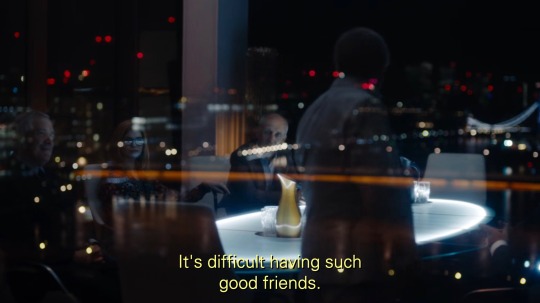
I think here Culverton smith is mirroring the writers, and his friends are the viewers. During the whole scene we have TONS of mirrored shots in the windows, most of it infact. In all of the previous seasons mirrors and character shots in mirrors were there to signal “hey this character is currently mirroring this other thing”, so idk it might be even this time??

Faith when she’s still drugged and tries to remember something about the conference, the first shot of her that we see, she’s in a mirror, even the desk reflect her image. Wander which part of the audience Faith is mirroring? Yeah, you guessed it. The tjlc fandom. The ones that analyze things. The ones that are questioning.

And the nurses? Idk, I’ve never seen a nurse that’s just putting an IV wearing a mask (unless under special circumstances of course), it never happens even when you’re taking blood samples, it just doesn’t ring right to me. So, who are the nurses? They’re people working for Culverton, they know what’s happening, they know what the solution is and what it does, they know how to administrate it, but they leave the room in the moment of confession. The nurses are mirroring BBC Sherlock’s crew.
If you’ve never worked on a set let me tell you: nobody, apart from the smallest possible amount of selected people, knows the whole picture, they can’t risk it, usually it’s just the writers, the producers, and most f the times the main actor; everyone else just knows the smallest informations to do their single job of adjusting the lights or hair for that single scene just like it’s written in their schedule.
So the crew knows partially what they’re doing, but they can’t speak, because their mouth is covered.
I’m thinking this is exactly the reason of S4. S4 is the memory drug. Everything made sense till now, tjlc was more and more evident, it was extremely obvious to everyone that johnlock was an actual thing, i mean just look at the sign of three, MY MOM THOUGHT THEY WERE CANONICALLY IN LOVE BEFORE I EVEN DID (at the time the fandom wasn’t the greatest so I avoided pretty much anything that wasn’t fan fictions or fan art, and just thought it was queer bait). Everything was super clever and well made. And then S4 came. A cheap Hollywood movie where nothing made sense and with john and sherlock great platonic friendship. And it was the last season so how could you not except what they already gave you and still want more, right?
Wrong. S4 is either complete bullshit or a distortion of what actually happens.
Culverton say that he can’t say his darkest secret because he can’t take it back, yet he does tell, and he does take it back.
The show does say that sherlock and john love each other (and are still pining) but S4 takes that back. You want the distorted version? Ok. Sherlock does explicitly says the words “i love you” in S4 to Molly in a physical mirror, a character’s mirror for John, whose description of the coffin perfectly fits John. The show does say that the writers aren’t stupid and aren’t making a tv show that’s just a blockbuster action movie, with cheap Hollywood effects and made up physic laws. Yet S4 takes that back.
The whole thing they kept saying in earlier seasons about “making history of television” and “making unprecedented things”? What unprecedented things? That was extreamely cheap cinematic, with really poor writings and a rip off of James Bond and classic horror movies. Nothing about S4 was memorable or relevant.
They already said everything they had to say (for the moment) but then they couldn’t leave the public waiting for another 6 years before S5 with all that hope and knowledge. Especially considering the fandom suspected even the phone\heart metaphor before ASiB even aired. Leave those people with the tiniest hope and you’d find your plans stripped naked for everyone to see in less than half of that hiatus. That’s really not Moffat style, he needs to give you hope, rip your heart open, surprise you leaving you gasping, only then he can make another plot twist and make everything super beautiful again and making you crying because it’s too many emotions.
So they said their things before S4, the fans that were still not sold on johnlock or didn’t want it canon were the friends who would rather not know, they went on with the brain washing of S4, and said “ok, we’re done here, nothing else to see, the show is finished, good night”. But just as with Faith’s story you can reconstruct if not all, part of what happened; because i don’t know if you noticed, but S4 doesn’t have a lot of plot holes, it is one single gigantic plot hole.
But what happens if they kill everyone just like Culverton Smith said? What happens if they make S4 so bad and destroy everything they said up until now with the show itself? What happens if the same people that were able to decode everything suddenly lost any faith because they were let down so much they just let the fandom die, and there was no one left to analyze what they were actually saying?
Everyone would forget all about TJLC and about how clever of a show it was. They would erase the whole show from people’s memories, letting it pass by like any other show that’s there to fill your Sunday evening.
Also there’s another thing that doesn’t sit right with me, although i don’t have any proof backing this up and am not sure of what I’m saying, it’s basically just speculation, but still. TD12 package:
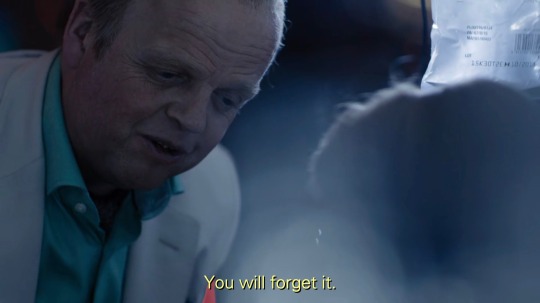
obviously this drug doesn’t exist, the only thing i came across with that name is a percussion sound module, you’re welcome to make your own theories with this informations since i know absolutely nothing about music technology and am not the smartest tool in the shed when it comes to music theories or clues.
I presume TD12 it’s something along the line of saline solution, since Sherlock made that replacement himself later in the episde, my research (because i also have no knowledge about medical stuff) told me that saline solution has en expiration time of roughly 2 years. On the package we see that the expiration’s date is October 2018, so counting back, assuming Culverton got the drug shortly before doing his speach, the scene takes place somewhere around October 2016. Wander what happened in October 2016?

On BBC Sherlock official YouTube channel they release just one video: Sherlock Series 4 release date. Now. You might say I’m looking a little to much into it, but if you go check the release dates of the other YouTube videos you would see that they usually don’t post just one video per month, that’s the only one around that time period. Idk if you ask me it’s a lot of strange coincidences.
Anyway, in the scene he then says “these drip feeds will keep the drug in your blood streams at exactly the right levels. Nothing that is happening to you now will stay with you for more than a few minutes. I’m afraid that some of the memories you’ve had up to this point might also be... corrupted.”.
So the victims starting now, will continue to take the drug for the next idk 30 minutes???? But apparently some of the events preceding that moment can be “corrupted”. Translated: everything starting from October 2016 is fucked up because of the drug, not only that, but also some things from before that. I’m guessing the “drips” would be the little occasional posts or news??
Might I add the information that in December 2018 the escape room Sherlock the game is now opened? Like, i know it’s not October, maybe I’m just looking where i want to look, but... I genuinely don’t know, that’s why I’m sharing things, so that people with a more objective point of view can come and say to me “hey you’re not making any sense, what the fuck are you talking about”.
And overall, I’m not native English speaker, but I don’t think you say “corrupted” when talking about human memories. It sounds more something used in the context of digital memories, usually it’s files that gets corrupted, not human brain memories.
#sherlock#bbc#bbc sherlock#johnlock#holmes#s4#s5#theories#tjlc#theory#fandom#otp#gay#lgbtq#culverton#smith#writer#steven moffat#mark gatiss#sue vertue#steven#moffat#mark#gatiss#writers
23 notes
·
View notes
Photo
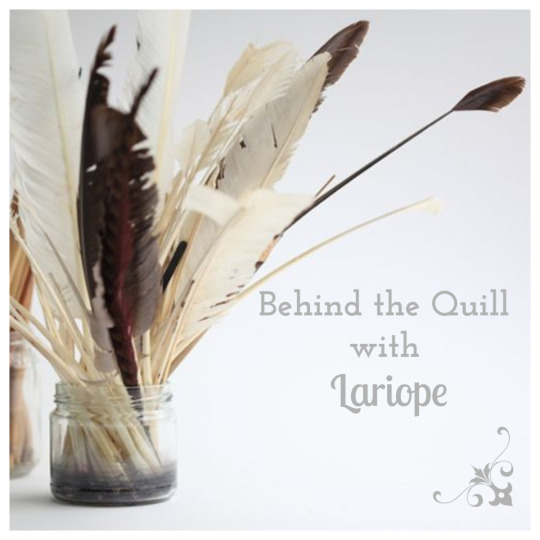
Interview given to The Severus Snape and Hermione Granger Shipping Fan Group.
https://www.facebook.com/groups/199718373383293/
Hello Lariope and welcome to Behind the Quill, it is a pleasure to talk with you.
Many of our group’s members requested you as an interview subject, but amongst more than a dozen stories in the HP universe you are probably best known for Killing Time, Second Life, and Advanced Contemporary Potion Making.
Okay, let’s jump right in.
What's the story behind your pen name?
So, there's a really common plant in my area called Monkey Grass. Most people use it as landscaping filler. I thought it was pretty and asked someone who had some what it was called. She told me that it's technical name is Liriope, which I heard as Lariope. This was around the time that book 6 was released, and it struck me as a very witchy name, particularly as JKR likes flower names.
Which Harry Potter character do you identify with the most?
Wow. Probably Neville. I'm certainly not as brainy or as confident as Hermione, not as out-there as Luna, not as athletic as Ginny. I'm less angsty than Harry and less apt to charge off in my own direction. And I am certainly not as thoughtless as Ron, not as strict as McGonagall, not as dark as Snape. And if you've read Second Life, you know my feelings about Dumbledore! But I was someone who took some time to come into my own. Often bumbling or nervous, but when my back is to the wall, brave and honorable. So I'm going with Neville.
Do you have a favourite genre to read? (not in fic, just in general)
I love fiction, but honestly, other than Harry Potter, I don't read fantasy! I tend to like "domestic" fiction, as in Anne Tyler, and literary fiction. I also really love Stephen King, oddly enough.
Do you have a favourite "classic" novel?
By classic do you mean like, the literary canon, or just not fanfiction? My top five favorite novels are, in no particular order, The Time Traveler's Wife by Audrey Niffenegger, It by Stephen King, The Amazing Adventures of Kavalier and Clay by Michael Chabon, The Temple of Gold by William Goldman, and The Secret History by Donna Tartt. I'm not big into the classics, which is weird for an English major to say.
At what age did you start writing?
I've been writing all my life. The first time I saw Stand by Me at 11 years old, I rewrote it with a new ending because I could not bear the death of Chris Chambers. I think I've always been interested in working with other people's texts.
How did you get into writing fanfiction?
I loved Harry Potter so intensely. I came to it as an adult at a particularly lonely time in my life. When book 6 was released I read it all in one gulp, and then felt kind of despondent when it was over. I thought of the good old rule of the internet, that if it exists, there is porn of it, so I went looking for what I called "Potterotica," figuring that it would give me an opportunity to read more about the characters I loved. I didn't yet have a concept of fanfiction, let alone fanfiction that wasn't erotica! As I read, I had the persistent feeling that I hadn't yet found exactly the story I was looking for. I kept feeling that I would do this or that differently. Then after the release of book 7, I was tormented by the fate of Snape. I really felt I needed to save him. That I couldn't relax until he'd had some love in his life before his death. I didn't have the sense yet that I could change his fate, only that I needed him to have happiness and love before he died. I have a Master's Degree in fiction writing, so I decided to just give it a try. My first story was terrible!!! It was called If Memory Serves and was archived only on the Restricted Section. But it definitely forced me to reawaken some skills, and whetted my appetite.
What's the best theme you've ever come across in a fic? Is it a theme represented in your own works?
Hm. I'm not sure how to answer this question. I know that one of the things that I respond most strongly to in fic is a feeling of inevitability--that regardless of how or when, these characters had unfinished business with each other. I hate to use the word destined... but that feeling that there were many points in canon where something minor could have changed which would have changed everything and brought two characters together--and that that could have happened at any point, in any number of ways. I like very much when canon is reimagined or reinterpreted to make that relationship deeper--like reimagining the scene where Snape insults Hermione's teeth to have a totally different meaning in the context of their relationship. I think I am remembering Somigliana's The Traveller being particularly gratifying in that way. Obviously I play with canon a lot in my own work. I like for fanfiction to feel "real" as in, possible in a canonical context.
What fandoms are you involved in other than Harry Potter?
Almost none! I've been fannish all my life, but Harry Potter was the first experience I ever had of "fandoms," that is to say, community built around a narrative. I usually just freaked out over things in private. After HP, I tried very hard to get into the Sherlock fandom, because I had a dear friend from the SS/HG community who was into it, but in the end, I could just never become invested in quite the way I had with Harry Potter. Subsequently, I had children, so I mostly support their fannishness now.
If you could make one change to canon, what would it be? Do you have a favourite piece of fanon?
I wish Snape could live. I really do. He had a lot left to learn and a lot left to give to the world beyond the sacrifice of his own life to the cause. There are certain things I have ultimately accepted as head canon, as far as pieces of fanon are concerned. Honestly, they are so ingrained that I'm having trouble thinking of any! Sometimes when I watch the movies with my kids, I think, but wait, what about?... oh yeah, I forgot that wasn't canon.
Do you listen to music when you write or do you prefer quiet?
I need dead silence to compose, because I hear the words in my head as I write and I can't be distracted from them. But I often pick pieces of music that I listen to obsessively in my downtime when I'm writing a story, that I think of as sort of like theme songs. Falling Slowly by Glen Hansard and Marketa Irglova was one for Second Life. Table for Glasses by Jimmy Eat World still calls up Dark Santiago for me.
What are your favourite fanfictions of all time?
Oooh. Ok. So I read a lot of Drarry, and I pretty much love everything that Sara's Girl has ever written. Somigliana's work--the Traveller was amazing. All the Best and Brightest Creatures by Wordstrings (Sherlock). I also really loved greywash's Sherlock fic. There was an SSHG that has been long since removed that was called Dear January--I still think of it. I loved all the epics of my particular time in the SSHG fandom. Mia Madwyn, Subversa, Loten.
Are you a plotter or a pantser? How does that affect your writing process?
Definitely a plotter. I kept pages and pages of working notes and planning points as I was writing Second Life. I always began a chapter with a working document of where I thought the chapter was going, as well as a reread of that portion of canon. Points of discovery along the way still happened all the time--I'd be in the midst of something I had planned when all of a sudden I'd see some point of connection I hadn't even thought of, and something would open up bigger than I had thought it would be. I remember in particular the end of the Bathilda Bagshot chapter of Second Life, when Snape is running toward James and Lily's house and feeling like time is doubling back on itself--I didn't see that parallel until I was in it. I think you always have to have room to surprise yourself, even in the thick of your planning. That sense of discovery affects the reader's journey through your work.
What is your writing genre of choice?
Haha, fanfiction is my writing genre of choice. No, I wrote short stories when I was pursuing my degree in fiction, which is kind of hilarious now, as I became sort of known for my long-windedness. Why say 100 words when 10,000 would do? I grew to love the novel during my time in fanfiction. It would be hard to imagine turning back to a shorter form now. But who knows. I always tell myself that once the children are grown I will get back to writing. I was beginning a sort of cross between fantasy and domestic fiction when I had children and I still think the idea has legs.
Which of your stories are you most proud of? Why?
Oh, different ones for different reasons. I think Dark Santiago is the most structurally tight and sound thing I've ever done. Second Life is like a miracle that it even happened, that I was able to control such a behemoth and bring it home. I was terrified the whole way. And weirdly, there's a drabble series that is called The Sins of Severus Snape that I am still really proud of. I think of those like linked poems. A real exercise in being concise for someone who likes to sprawl all over the page.
Did it unfold as you imagined it or did you find the unexpected cropped up as you wrote? What did you learn from writing it?
I think I've pretty much covered those questions in all my ramblings. I knew the general structure, I was happily surprised along the way, and I learned to write novels from writing fanfiction, Second Life in particular.
How personal is the story to you, and do you think that made it harder or easier to write?
There's not a lot of personal parts of the story to me in Second Life. I mean, every character is drawn from me, in a way, just because they come into being informed with my way of looking at and understanding the world and other people. But there isn't a lot in there that echoes my experience. Advanced Contemporary Potion Making was personal, and I think you can feel that in the story. It takes the biggest step away from canon. It wasn't hard to write, but it was hard to live. And now, as I look back, I have a different perspective on my life and on the story itself than I did at the time that I wrote it.
What books or authors have influenced you? How do you think that shows in your writing?
Oh man, Stephen King is all over my writing. I don't think I've ever written a sex scene that didn't have a grain of that scene in the sewers of It inside it. Not because of the child thing--I know that skeeves people out about that scene--but because in it, Beverly discovers the power of sex--sex as a force, a life-giving force, something with teeth. I think that idea shows up a lot in Second Life. I like fiction in which you are very much inside the character's heads, and I think that's apparent in my writing. I think I got that initially from Stephen King, who leaps around inside his different character's heads sometimes in the same paragraph! I also think the theme of unending loyalty, the power of friendship, the triumph of good over evil--those are very Kingian themes that I recognized in Potter and then carried into my own writing.
Do people in your everyday life know you write fanfiction?
Yes. That wasn't always the case. During the time that I was active in the fandom, I was a young elementary school teacher, and I dreaded anyone finding out that I wrote sex scenes with children's book characters. I was very private about my fanfic then, and even a few of my closest real life people did not know. My parents still do not know. My children are teenagers now and into fanfiction in their own right; they know I wrote it, but they don't know my ship or my pen name. My husband has read most of Second Life. I recently started a new job, and during one of those "get to know you" games, I was asked to share something that other people wouldn't guess about me. I said that I had once been a fanfiction writer.
How true for you is the notion of "writing for yourself"?
Mmm. I wrote the stories I wanted to read. Do you know what I mean? I wrote things because that's how I wanted to see them, how I wished they were, and I wrote to my own preferences. But writing in real time, for people who were actually reading and responding--that was crucial to the process. My biggest fear during the writing of Second Life was that I wouldn't finish it, or that I would lose control of it and it would become crap. "Breaking the story," I used to say, and I was terrified of breaking the story. But the fact that there were people experiencing it with me and waiting for it, reacting to it, and giving insightful feedback--that helped keep me very focused and motivated. I never wrote something because I thought it would be appealing to others, but I was so gratified that what I wrote did appeal to others.
How important is it for you to interact with your audience? How do you engage with them? Just at the point of publishing? Through social media?
I had a LiveJournal and although I was not a frequent poster, I read my friends list every day during that time. I read what everyone else was reading and talked about the stories and themes that everyone else was talking about. I made a number very close friends during that time--other authors, people who were reading my stories and commenting. We talked on the phone frequently, and I had a team of beta readers. I went to conventions. I participated in the ss/hg exchange. A lot of those people were my audience, were reading my stories. And many of them became my good friends. I had a policy to answer all reviews when I was writing Second Life, and I did that until I was unable to do it anymore. When I had multiple stories it got much harder. That community changed a lot toward the end of my time in it. People were leaving LiveJournal, and Tumblr was on the rise, which felt like a much bigger pond. AO3 was replacing the smaller archives on which I had really grown as a writer. And once the movies were over and there was no more "fresh canon," people started to drift away. I do think that I might have lasted longer if that tight knit community had stayed in place. It played a big role in my commitment to my work and continued enthusiasm. As a side note, one of the friends I made in the SS/HG community is still my best friend. She is the "aunt" to my children, and we still talk on the phone weekly and visit at least yearly.
What is the best advice you've received about writing?
If you want to write, then write. Make a routine. Write a certain number of words a day. Read them out loud to yourself. You'll hear your own bad habits and improve them.
What do you do when you hit writer's block?
If I'm already in a project, I will force myself to write a certain number of words per day. I will hold a scene that I'm longing to write out in front of myself like a carrot. Like, if you write this transition part that feels yucky and like you are stuck in it, then you can write the big reunion scene that you know is coming. If I'm not in a project... well, then I don't get through it. I just don't start a new project. If I need to write a story, as I did during graduate school or during the ss/hg exchange--I would do this thing one of my professors suggested--pick three headlines, words or ideas that have interested you over time and force them into the same story. Dark Santiago was that way. I had the prompt of fortune telling. I added an idea about the way magic works for muggleborns and the ocean town where I was living. Voila: Dark Santiago.
Has anything in real life trickled down into your writing?
I'm sure it has in ways I can't even see. I remember once talking to a friend on the phone about Second Life as I was writing it, and she pointed out that the fact that I'm a Quaker was informing the story--like my own perspective on war and the horrors of violence were bleeding into the the kind of philosophy of Second Life.
Do you have any stories in the works? Can you give us a teaser?
I don't. I wish I did! I often miss my time in fandom, the spirit of creativity and community, all those ideas just bubbling out in every direction.
Any words of encouragement to other writers?
I don't believe that the end goal of fanfiction is to become a published writer, just as I don't think every guitarist has to have the goal of selling out a stadium, or every golfer has to want to compete in the Masters. I think you can love a thing without making it your livelihood. You become a "real" author the minute someone else reads a story that you wrote. Many of you reading this right now are people who made me an author. It is, as Stephen King once wrote, a kind of telepathy. I thought of something once, in 2008, in the southeast of the US, and you can read it right now wherever you are, and experience the thoughts and feelings I was dreaming up then. It's a wonderful gift, writing. And working among people who are dedicated to improving their craft and talking about stories and ideas--that is just the very best ground for making something that makes YOU proud.
Thanks so much for giving us your time.
Thank you! I am really honored to be asked
5 notes
·
View notes
Text
More Mary Thoughts
@wizardlysherlok replied to this post on AGRA/Agra parallels in Doyle-cannon and BBC-canon:
it feels like if AGRA was empty of full, it wouldn’t be right for john neither way: if it was full, it would the the great betrayal and also the “she wasn’t supposed to be like that”, the wife who lied immensely to her husband and(for god sakes) shot his bf. If it was empty it wouldn’t work either because it was boring and the same life john was trying to scape because it was making him unhappy...conclusion : Mary does not work for john in every way
Ooh, a chance to talk about Mary generally! I’ve apparently got just enough codeine still in my system, and it’s close enough to the witching hour, that this seems like a fun topic rather than the don’t-poke-the-bear dread that usually falls on me when I speak her name in this fandom. Here’s hoping I don’t regret this come tomorrow.
Even in Doyle canon, I never particularly liked Mary’s story, which is meant as a judgment on Doyle and not some fictional woman. She’s clearly introduced because Watson --being a romantic-- needs a romantic partner, and for a whole host of historical reasons Doyle felt like it needed to be a woman. Any woman would do, apparently. And even without getting into issues of whether this is akin to queerbaiting, it also just makes for a very boring character IMO. Mary is the equivalent of a Bond girl : more saintly than sex-appeal, perhaps, but who only really exists as an object the male characters get to react against. There’s precious little of Mary specifically that makes any difference to SIGN.
I do like some of the grace notes Doyle gives her in later stories. I think there’s a reference in one of the stories that she had a reputation for being both kind and clever and women from her neighborhood came to her to help them solve their little problems, a sort of more everyday vision of Sherlock Holmes. But at least in SIGN she’s a walking trope and frustratingly little more.
I think the Granada series was wise to leave her out almost entirely. (She only appears in the movie version of SIGN, and there is only a client.) She just would have been a distraction to the story they were trying to tell. In the RDJ/Jude Law movies she’s actually brilliantly done, somehow challenging and supporting their relationship at the same time. She’s also witty and daring and would not seem at all out of place in a Jane Austen novel with all that witty back-and-foth, and all three of them have this great chemistry. If ever there was an adaptation that screamed both Johnlock and Johnlockary (and of course Warstan), it’s this one.
Goodness, we need more fanfic about Kelly Reilly’s Mary. I need to write her again. She’s brilliant.
Which brings us to the BBC. I’m going to be very brave and say my biggest problem with her isn’t that she wedged herself into John’s and Sherlock’s relationship and somehow came away with the right to dictate its terms, even posthumously. It’s not even that she lied to her husband and manipulated him, endangering him and their child in the process; or that she shot Sherlock, or was an assassin who apparently went mercenary. All of that could be really interesting if done well! And really, I can think of storylines that would actually justify quite a lot of that. Even shooting, even killing Sherlock, even not being apologetic about it after the fact- I could write a story where that character made sense as a romantic opposite to John. I actually got about 10,000 words into one attempt, though I never finished or published it because the fandom was pretty toxic to anyone interested in a more shades-of-grey ersion of Mary at the time.
No, what really drives me up the wall with BBC’s version of Mary is they don’t really settle on any one version of her. Actually in each of the five episodes she appears in, there’s this radically different version of who she are and what motivates her: supportive friend; bride; sociopath assassin; government agent; martyr. The most sympathetic take on that I can give is that Sherlock himself is trying to figure her out and can’t make sense of her so keeps trying one mold after another. But whatever the intent, the effect is that Mary’s just ridiculously muddled for me, and I never really connected to her because I didn’t understand her. I’m not sure the show-runners did either. Seeing what Moffat in particular did with women characters in Doctor Who makes me think he genuinely struggles to find them interesting if they aren’t really... extra, for lack of a better word. John and Sherlock, being men, had their BAMF moments but also a psychology that actually made sense along somewhat normal terms; Mary had to be a super-sekrit assassin, and a rogue that was targeted by a media mogul, and the hero who saved Holmes and then did it again from beyond the grave. All of which would have been fine if it actually came from a coherent characterization. But BBC’s Mary was all BAMF and stunning reveals and little to no coherence that made that make sense, so her character never really developed any kind of a reality for me. My brain couldn’t make sense of her, so my heart never latched on either. In the end I was just left confused and frustrated
Even all these years later! I still don’t know what to make of her, and that’s just bad writing. I would love to have a Mary who lied from start to finish with John “Trust Issues” Watson, or who shot Sherlock to the chest where it somehow made sense. That could be fascinating. It’s not what we got, though; at least it’s not what I was able to get out of the show.
Here’s another thing that would be fascinating, and I’d really love to see in some adaptation; even this one, though I don’t think we’ll get it. Mary Morstan in 1895 makes some sort of sense even with a suspiciously close friendship between Holmes and Watson, because male friendships operated in a very different realm than heterosexual marriages did. There were different kinds of intimacies in that time, I think. But when you bring the characters into the modern world, it eems like a super-close friendship like Holmes and Watson seem to have, one that seem to emotionally resemble marriage even if there’s no physical/sexual component, would be a challenge to what any self-respecting modern woman would tolerate from her husband. I don’t mean because it makes John gay, and of course married people can have friends, but there’s something about John and Sherlock that in the modern world strays damned close to emotional infidelity.
I mean, how can you have that without either weakening the relationship between John and Sherlock, or making Mary cuckolded in some sense? Now throw into the mix in this particular adaptation, even before Mary, John and Sherlock had a ... unique relationship. John would date and have sex (or not), Sherlock would be stuck in seemingly perpetual celibacy, but if Sherlock dared to date (and I think this would be true for a man as well as a woman) John goes into a disbelieving jealous rage. This strikes me as not normal male friendship, though it’s not romantic or sexual either. It’s queerplatonic af on Sherlock’s side, increasingly stretching the bounds of what can be called “platonic”, and for John, it’s kind of a monodirectional monogamy in at least an emotional sense. I mean, the man went and got married, but we all saw his reaction when Sherlock dared to (seemingly) date someone else.
Now throw a modern woman into that mix, trying to marry and start a family with one half of a duo in that truly fucked-up dynamic. Imagine what it would be like for her to exist in that world. You can imagine polyamory of some variety, or jealousy, or a very altered view from what the mainstream imagnes are the expectations of married life, or whatever spin you like to put on it.
I guarantee you -- if done well -- it would be fascinating. And I’d very much like to see it. Or read it, or something. If you want to make that woman as much of a danger junkie as John, as much of a skilled, professional killer, wehther on the government’s payroll or a disillusioned former agent who refused to follow orders and was forced to “branch out” or even just a true psychopath who was utterly self-motivated and ruthless but still wanted to protect John or at least what John represented to her?
Well, that could be fascinating, too. Even more so. There’s just one catch: you’ve got to actually tell the story. They never seemed to get around to that, and I think I’m still more than a bit bitter.
..... And apparently I’m rambling. Thanks for allowing me to talk about her a bit. I’ll shut up now. :-)
11 notes
·
View notes
Note
i just want to tell you that while i haven't read new sherlock fic in literal years and have no interest going back to that fandom or browsing the ao3 tag ever again, compatible damage is so important to me that i reread it regularly and if i ever got an e-mail notification saying you updated it, i'd drop everything immediately and check it out. this isn't meant to be a shitty please update ask though, i just want to say that i have a lot of feelings about that au and i appreciate your writing!!
You’re wonderful. I feel the same way about Sherlock fandom but sometimes I wish I could get back into that headspace just so I could finish The Silences,
Here is how that story was going to go, if anyone cares:
--The premise of the story was that it would mash up the basic plot of the Arthur Conan Doyle story The Abbey Grange (Holmes decides to let a naval officer off the hook for killing his friend’s abusive husband) and the Holmes backstory from The Adventure of the Gloria Scott (Holmes’ bff at college was a guy named Victor Trevor whose dog bit him on the ankle).
--The same early 20th Sherlock Holmes pro fic (the Baring Gould book) that gave us William Sherlock Scott Holmes as his full name speculates that Mrs Hudson came into Holmes’s life via the Australian criminal named Hudson who blackmailed Victor Trevor’s father.
--In my fic, “The Silences”, Victor Trevor and Mrs. Hudson have a close bond, because she was around his family when Victor was a kid and when her husband died it was good for both of them. He was abusive and Victor saw the ugliness and pain of all of that first hand.
--Years later, after going into Ambiguous Spy Work following a naval career, Victor finds out that an old friend, Mary Foster, is now trying to escape an abusive marriage. He tries to help Mary get out, but when her husband finds out, Victor kills him, and the case is unsolvable by the police because Victor is MI6 and just that good.
--...Yeah I am just now realizing that the plot of this story is basically John Reese’s back story from Person of Interest which explains a whole lot now I think about it.
--Anyway, in the period between “I have to get Mary to safety” and “oops never mind, the abusive jackass is dead”, Victor writes to Mrs Hudson: “Do you happen to know if Sherlock is still alive because I would like to discuss A Situation with him.” Mrs Hudson gives Sherlock that letter, prompting Sherlock to reach out to Victor.
--Victor has already committed the murder he wanted Sherlock’s help to avoid having to commit, so...he acts real cagey. But he’s a spy so, that tracks, and Sherlock is not that suspicious at first.
--But Lestrade has been tasked to solve the murder of Sir Eustace Brackenstall because blah blah important dude unsolvable case, so he attempts to get Sherlock and Joanna in on it. Joanna is down. Sherlock is, “No, my one purpose in life is to tend to Joanna’s medical needs until she is fully recovered.”
Joanna: Getting you out of the flat is a medical need that I have. On account of, you are suffocating me.
Sherlock: That’s just the opiates I drugged you with talking.
--This story was always meant to be the culmination of the <a href=“https://archiveofourown.org/series/13134”>Compatible Damage series</a> theme of “Joanna Watson has expert knowledge of how trauma and domestic violence cause people to behave in irrational ways that baffle Sherlock’s deductive logic”
--Because Joanna is recovering from the serious injuries sustained in <a href=“https://archiveofourown.org/works/294574”>Let Sense Be Dumb</a>, she spends a lot of time chatting with Mrs. Hudson while Sherlock is investigating for Lestrade and getting reacquainted with Victor. Mrs. Hudson talks a little about her awful marriage (this was all plotted out long before there was any Mrs. Hudson back story in BBC canon) and thus, Joanna is very In That Headspace where she’s having trouble with the concept that healthy relationships can exist, especially heterosexual ones. (I am not sure if I ever made it clear but Sherlock and Joanna are both biromantic and slightly ace spectrum in my stories.)
--Things are very tentative between Sherlock and Joanna. They’re both aware that they want intimacy with each other, of some kind, that they love each other, to the extent they understand what that means, but how the hell do they proceed? Joanna’s in bad shape, Sherlock is constantly anxious and overprotective and slightly smothering in his nursing duties, and is also terrible at nursing. Joanna is just tired of Other People and sometimes, Sherlock Specifically.
--Mrs Hudson offers to cook a big dinner so they can have a small party and invite Victor and his new fiancee Mary over! This will end well. Actually, it goes great, and Victor is over the moon to meet Joanna and they bond over Sherlock’s baby pictures so to speak, and then Sherlock takes Victor aside for...idk, something, and Joanna and Mrs. Hudson and Mary all have an after dinner tipple and a chat...
--...and by the time Victor and Mary are getting into a cab, Joanna knows for A Damn Fact that Mary’s previous relationship was abusive, and that Victor was trying way too hard to charm everyone. She doesn’t say anything to Sherlock because...it’s a friend! A Sherlock friend! She isn’t going to fuck that up! Please get Sherlock out of the flat, Victor, Joanna needs some space! But boy that was some suspicious body language and protective behavior she saw.
--Lestrade is coming over a bunch, because he and Joanna are bros, and Sherlock is Unavailable For Detective Work Because Joanna is Hurt, so Lestrade gets Joanna to help him think shit over. So that’s how Joanna finds out that Mary Foster was Lady Brackenstall, until recently.
--From the outside, there is no evidence of abuse in the Brackenstall’s marriage. Lestrade isn’t even looking at the wife as a suspect or a motive. The “gang of thieves in the area” thing from ACD canon is still his best lead.
--In the ACD story, Holmes stages a mock trial where he exonerates the naval officer, acting as judge, with Watson as the jury. He’s cleared and sent on his way to marry Mary and start a new life. Watson is not thrilled that Holmes is “taking the law into his own hands”, but as Holmes says, furiously, “I am not retained by the police to supply their deficiencies.”
--In this story, that decision is going to fall on Joanna. She is the only one who has figured out, or can figure out, that a) the murdered dude was beating his wife and that b) his wife had a close friend who was dangerous as hell and would do anything to keep her safe. Unless she makes that link for Lestrade, the case will just go unsolved.
--And the thing is, she doesn’t even feel completely certain that Victor did the killing. The timing of the murder is off, for one. He would have had to show up at the Abbey Grange house and shoot Sir Eustace more less within an hour of getting back to England. It’s a really narrow time window, and it only creates a bare sliver of possibility, and she really wants to ignore it.
--Except, then she and Sherlock have a moment. Joanna tells him that Mary’s husband was abusive, without drawing the connection to Lestrade’s murder investigation. Sherlock doesn’t put the pieces together until the next time he’s with Victor and Mary together. He thinks about what Joanna told him, and he sees how tender and protective Victor is toward Mary. It gives Sherlock a nasty turn, because 1) That is how he looks at Joanna, so does that mean that he and Joanna are supposed to be a couple like Victor and Mary are? and 2) He knows how he feels about the various people who have hurt Joanna, which is to say he wants very much to Kill Them All, and if Joanna got married to another person, and that person trapped her in the house and hurt her on a regular basis, then Sherlock would...
well
Sherlock would do what Victor undoubtedly did, and kill the fucker.
--The resolution, as far as I had it planned out, was that Joanna confronts Mary (instead of Holmes confronting Captain Croker, as in the ACD story), Mary admits it, Joanna feels satisfied that the actual killing really was unavoidable self defense. She feels bad keeping it from Lestrade, but Mary and Victor are planning to leave the country and not return. So Joanna lets them go.
--And then she tells Sherlock what happened, and what she did, and is prepared for it to be a Thing, except then Sherlock admits he made the same deduction at practically the same moment, and explains how he came to the conclusion, and they agree that after Victor gives them an all clear, they’ll give Lestrade enough information to close the case.
--And then Sherlock and Joanna awkwardly face down their big big emotions and it’s painful and weird but they smooch, and are a couple, and that is the end of the series.
28 notes
·
View notes
Text
Sherlock S5/Dracula Meta
I’ve been thinking about this for a long time. I’ve never written any fan theories or meta before (although I have so many), so please bear with me. I know my theory is going to sound a little out there, but I here it is: I think BBC Dracula is actually Sherlock S5, or else that it is somehow going to lead directly into it without warning.
Warning: this is going to be a long piece. I’m going to break this down as follows, because there are many different pieces of evidence to examine:
TFP, the story and the episode
Gothic Horror, HOB, Dracula
Vision, Timing, 20/20
The Final Problem
The first one is a fan theory I read probably 6-9 months ago that sadly I can’t find anymore (if you know who this person is, please please comment so I can give credit!). Basically this person was talking about how the naming of the episodes typically has some tie to what occurs in the original story by that same name, but how TFP has nothing AT ALL to do with the original story. In the original story, Sherlock goes face to face with Moriarty, and we are all lead to believe that both he and Moriarty die over the Richenbach falls. In all reality, ACD had meant to kill off Sherlock in this story, and stopped writing Sherlock Holmes stories for ten years before bringing him back in “The Empty House,” due to the public outrage and demand for more stories. So, the logic follows that maybe the one thing that they have in common is that they are both pitted as the end to Sherlock Holmes (in the story, he is dead; in the show we are given [force fed] an ending, it's made to seem like the final piece). The author of this theory also pointed out the show runners in this way are comparing ending the series with TFP (no canon Johnlock) to ending the show with Sherlock dead. We are left with a straight-washed version of John and Sherlock, with Mary’s voice controlling the narrative and that narrative being: It Doesn’t Matter Who You Are. The chemistry between John and Sherlock has been more or less completely lost throughout S4, and so we are left with this empty, dead-feeling version of them that doesn’t feel true to the characters we know and love. Even casuals thought S4 sucked.. this is why. They metaphorically killed them/killed the show.
Before S4 aired, Mofftiss had said that if they pulled off what they had planned, it would be the biggest thing in television. Well, what we got in TFP doesn’t really fit that at all, does it? What could they be referring to: A secret sister? Not really that epic. Even if we find out that most of S4 didn’t take place (either EMP theory or some other way of explaining it) that isn’t really a new trope. The audience discovering that they have actually been seeing things that are inside the main character’s head the entire time has been done over and over (Sixth Sense, A Beautiful Mind come to mind off hand). So what could this huge, history making move be? The argument that the meta I read previously made was that the show will come back (from the dead) unexpectedly, with no warning. That it will be a revival and in that revival, we will get canon Johnlock. I can’t remember if OP explicitly theorized that Dracula is actually Sherlock S5, but I think so.
Now, I was with this theory from the beginning.. there is just something that feels possible to me, despite the fact that it sounds far fetched. Dracula seems like a weird, random thing to do when Sherlock, Moftiss’s mutual obsession, isn’t finished. (Also creating an escape room to keep up hype is odd if the show is over, but I digress.) I just don’t believe Moftiss’s constant claims that they couldn’t get everyone together to film S5 because of schedules, that they wanted to take a break, that they don’t know if they will do more (when Moffatt has talked about wanting a 5 season arc before, not to mention John Yorke). And then there’s the fact that we know they have filmed scenes that we have never seen (Niagara Falls anyone?). All this evidence that S5 is definitely coming, combined with the fact that we haven’t heard anything about it but have heard about Dracula, sort of fell into place for me. Despite me being willing to buy into it, this theory still seemed a little far fetched. But wait, there’s more!
Victorian Gothic Literature, HOB, Dracula
A lot of people have been talking about how gay Dracula is going to be, and citing evidence of the connections between Bram Stoker and Oscar Wilde (Dracula was written directly after his trial and Dracula is read as having characteristics of Wilde) as evidence. This, along with the extremely homoerotic last clip of the trailer, certain parts of the text that read as queer coded (I haven’t read Dracula, so I don’t know much but have seen some things floating around that seem v gay to me), and what we know about queer coding in Victorian gothic literature in general, all make a convincing argument. Gatiss actually recently confirmed (more or less) that Dracula will be bisexual in the upcoming series. And while I’m all about gay vampires (I am a huge vampire fan, seriously I love Vampire Diaries and True Blood and was one of “those girls” during the middle school Twilight craze), there is something about Dracula being Moftiss’s first cannon gay show that feels both disappointing and incongruous.
I want to bring up the All Ghost Stories are Gay Stories meta by heimishtheidealhusband. Now, this meta was written in 2015, in anticipation of TAB. Its great and you should definitely check it out if you haven’t/don’t remember it. The part I am most interested in is actually the reading of HOB, which I will get to in a bit. The takeaways from the first bit of the meta are that monsters and ghosts (to a different extent) are representations of queer desire in Victorian gothic literature. I’m summarizing drastically here, but as queer desire was obviously unacceptable in Victorian times, writers would obfuscate it by creating an “other,” a monster or ghost, that represented the queer or “inverted” desire and also demonstrated the fear and horror that society had for homosexuality. So the monster becomes the representation of homosexuality (homosexual acts or desires) that is pursuing the protagonists. Oftentimes, the protagonists were originally obsessed with the monsters or the concept of them, before actually confronting them, but are terrified and frightened when it actually occurs (think Dr. Jeckyll or Frankenstein). This meta also specifically talks about Dracula and vampires as the most queerly coded of the Victorian monsters: “Think about your vampire tropes: Dracula sneaks into your bedroom at night, lusting after your bodily fluids. The victim, meanwhile, is paralyzed with fear, but also excitement. (Oh hi phobic enchantment, I see you there!) The tension mounts until there’s a climactic penetration of fangs into flesh. And lots of sucking. Then think about the fact that the one doing the penetrating and the one being penetrated can be - and often are - both male.”
This all seems to bode great for our queer reading of the new BBC Dracula, yay! Vampires are clearly queer coded, and making it explicit makes sense and seems like a no-brainer. But I think it’s important to point out the ways in which this is also potentially (and likely) problematic. In Victorian times, there weren’t really many other options for portraying homosexuality. This is part of what makes what these writers did so brilliant - they were unable to show these desires as normal and healthy, because it was too dangerous and society didn’t see them that way (hence the use of the word “inverts” for homosexuals). Using the horror genre allowed them much more freedom to explore homosexuality, identity, and societal reactions to it, but also obfuscated the difference between reactions to homosexuality and the thing itself. In some of the stories, like Frankenstein, the monsters are actually misunderstood. Frankenstein’s monster only turns evil after experiencing society’s horrified reaction to it. However, in a modern context, I wonder about the message it sends to remake a Victorian story in a modern time and make the monster queer.
To flush this out a bit, I think it would be helpful to take a look at how Moftiss (and particularly Mark Gatiss) have played with this Victorian monster trope already, in Sherlock. Which brings us to HOB. heimishistheidealhusband points out that ACD’s original story “The Hound of the Baskervilles” would definitely fit into the scope of Victorian gothic literature, and their meta “All Ghost Stories are Gay Stories” does a particularly good job of breaking this episode down with the lens of Victorian gothic literature and queer coding. I am going to quote this reading here, and also also want to touch on the reading of this episode by Rebekah of TJLC Explained.
Here is what heimishtheidealhusband has to say about this episode: “Here’s why BBC Sherlock’s treatment of Hound is particularly beautiful. The creature – the hound – is our queer monster. In ACD’s Hound, the hound was indeed physically altered – he was painted in phosphorous to give him a hellish, glowing appearance. And the hound was actually the one to do the killing. In BBC’s Hound, there’s “the hound” – the monster that everyone is afraid of which is actually imaginary, and “the dog” – the real thing that actually exists. In other words, in this version, the “queer creature” in the horror story has been de-monstered. Homospectrality is being flipped on his head – rather than separating the man from the queer, they’re separating the queer from the monster. Because the dog isn’t inherently evil, it’s just the poison in the air that everyone is breathing that makes them fear it, and see a monster instead of an innocent dog. So in this treatment, if the dog/hound represents queerness, heteronormativity becomes a poisonous element in the air we all breathe.”
This is why it is so important that Hounds is plural (as opposed to the original story “The Hound of the Baskervilles”). They are emphasizing the differentiation between the two dogs, the differentiation between the monster and the queer. Rebakah of TJLC Explained also points out that despite all the conspiracy theories, there is actually no monster inside Baskerville, but rather a rabbit that glows “like a fairy,” (let’s all take a moment to remember the skipping dance and sing-song voice Ben does in this scene, in case it wasn’t obviously queerly coded enough). It’s hard to imagine a less-threatening animal than a glowing bunny.
Mark Gatiss has been very open about his love for horror and the gothic. He has studied the gothic writer M.R. James, and was involved with the BBC documentary about James that explored his “repressed sexuality.” He clearly loves and respects the genre, and is familiar with queer readings of Victorian gothic lit. In HOB, he chose to engage with the genre in a modern context, and to separate the monster from the queer. In doing so, he points out the inaccuracy and harm that coupling queerness with monstrosity generates. With this in mind, the choice to make Dracula feels like a step backwards, especially when you bear in mind that Gatiss has actually said that he isn’t really interested in gothic horror anymore. In an interview with Shadows at the Door in 2017, Gatiss stated: “I used to think nothing could exist without waistcoats and bubbling test tubes and now I’m actually more interested in modern horror; the gothic but in a modern context. I don’t think it has to be about the old and obviously I still love it but it doesn’t have to be about candelabra and castles. You can get the same feeling from modern methods, and in a way that is more frightening.”
All this isn’t to say that gothic horror or vampire stories isn’t still interesting and worthwhile as a concept, or that a canonically queer Dracula wouldn’t/couldn’t be badass. (I for one would love a Vampire Diaries remake wherein Damon’s character is a woman, but I’m off topic..). It doesn’t even mean that there can’t still be something complex or provoking in this representation for a modern audience. But it also feels dangerously close to repeating the queer coded (or even plainly queer) villain that we have all seen a hundred times from horror films and Disney movies. At best, still doesn’t seem particularly new or exciting, and at worst it could reinforce frankly problematic and dangerous stereotypes.
I am now going to analyze the actual trailer for BBC Dracula that was released a few weeks ago, because it is going to help me to illustrate this point. One thing that struck me most when watching it was just how horrific it really is. The 45 second long trailer includes: a fly that crawls into an eye, a bloody fingernail being ripped off, a blood covered hand, something that appears to be being birthed, a scary, old-looking Dracula with a bloody tongue, and bloody flesh that is being carved. There are at least 3 instances of mouths: the fangs at the very beginning, the mouth with bloody tongue, and the frame after the gunshot of a mouth that looks desiccated like a zombie, that only flashes for a split second. All in all, it’s not only scary, it’s quite disgusting. The three bloody or otherwise monstrous mouths that we see relate most strongly to the covert sexual tones of Victorian gothic literature (and also remind me of Moriarty’s oral fixation in TAB). These are some of the most disturbing of the images. While the intro fangs are pretty mild, the clip of Dracula’s frightening face and bloody tongue (which is followed immediately by the bloody flesh being carved) and the decayed mouth are both quite gruesome. If we apply the metaphors that we know from Sherlock, they are making some pretty damning connections. The mouths in-and-of-themselves could be read in a sexual way, but then there is the added fact that the decayed mouth appears directly after a gunshot, which we know has been tied to dicks/gay sex in Sherlock (and generally). The bloody flesh being carved on a table also recalls the food/sex metaphor in Sherlock, specifically reminding me of how disgusting the meal scene is in John’s wedding to Mary. Food and eating can be really disgusting, and this trailer makes a point to show us that. When we connect this back to the sex metaphor again, and give it a queer lens, we are once again being metaphorically told that queer sex is disgusting and horrific.
Whether or not Moftiss are purposefully making these metaphorical statements, they definitely went out of their way to make this variation of Dracula particularly scary, horrifying, and gruesome. It’s always possible that they are just hyping up the goriness in order to get audiences excited. It’s also possible that they are highlighting the disgustingness of Dracula’s monstrosity as a means of engaging with the public perception of homosexuality or that they will complicate the narrative in some other way. But even if we give them the benefit of the doubt here and assume they aren’t trying to paint queerness in a bad light, this highlighting of the disgusting nature of Dracula’s monstrosity doesn’t seem to push forward any kind of unique, modern narrative. We have seen this, this is exactly what Victorian gothic literature is all about. They needed to explore homosexuality through its repression, to make it monstrous, because they lived in a time when there were few alternative ways to explore it (except for maybe the example of our sweet “bohemian” boys - check out this meta from artemisastarte to learn more about bohemianism and queerness in Sherlock Holmes). But in our modern day, is this really that exciting? Is this the kind of queer representation we want and deserve in 2019 (soon to be 2020)? To me, the answer is no, especially in light of the incredible and complex work they have done in Sherlock toward building a queer love story that is normalized, and completely removed from any conflation with monstrosity.
The fact that Dracula is tied so heavily to Sherlock makes this distinction even greater. Gatiss said that they got the idea for Dracula from a still image of Benedict Cumberbatch on the set of Sherlock with his collar up. Supposedly it reminded them of Dracula and the BBC asked them if they wanted to make it. In an interview, when asked about Dracula in relationship to Sherlock, Gatiss called it a “stablemate” of Sherlock Holmes. I’m not really sure how we are supposed to take this, and he doesn’t explain at all (of course), but that would mean that they are in some way similar or connected. I think he doesn’t just mean that they both come from him and Moffatt, as that is rather obvious and was acknowledged in the question itself. Both shows are not only created by Moftiss, but written in the same format, produced by Sue Virtue, and shot at Hartwood Studios. They also really emphasize the connection to Sherlock in the trailer (which isn’t surprising because advertising), and also in the new Netflix description, which states only: “From the makers of ‘Sherlock,’ Claes Bang stars as Dracula in this brand-new miniseries inspired by Bram Stoker’s classic novel.” There isn’t even a background image, only a weird gray distortion on a black background.
Furthermore, there are also elements from Sherlock that point to Dracula, either directly or indirectly. In S4, when John is supposedly texting “E.” He asks “Night Owl?” and the response he gets is “Vampire.” It feels odd and out of place to mention vampires in this offhand way, as we have never really seen anything like this on the show. To be fair, a lot of S4 feels this way, but I believe that it is actually chock-full of symbolic meaning and that almost everything that we see that feels wrong or untrue to the show has a deeper meaning. What, then, is the purpose that this plays? Additionally, in the escape room (Spoiler alert for The Game is Now), there is a television in the first room (Molly’s lab) that is playing what is set to look like British news. In the newsreel at the bottom, they included the announcement that Mark Gatiss and Steven Moffatt are making BBC’s Dracula. Once again, this feels a little throwaway, or could be explained away as advertising (although the escape room is so fast-paced that having any time at all to look at the television, let alone read it, when it wasn’t explicitly part of the puzzles would seem rare). Once again, there is a subliminal connection made between these two shows that I would argue is purposeful.
The decision to make a gothic show that so completely plays on this horror trope, and then to tie it both explicitly and implicitly to the show that they have already done, which has a very different messaging around the gothic as it relates to conceptions of homosexuality, seems odd. In and of itself, a Gothic exploration of queerness is possible, but feels limited by its very nature. Gothic horror through a queer lens is about queerness and otherness being equated to and embodied by monstrosity. Dracula’s trailer seems to clearly be playing up this monstrousness. I want to reiterate that I don’t think making something like Dracula gay couldn’t be cool or interesting for what it is, or that there isn’t a way to engage with the gothic without it being problematic. But in comparison to what they are doing with Sherlock, it feels unimpressive. And in light of HOB, Dracula seems to go directly against the argument that Gatiss makes so beautifully, that queerness is harmless and very distinct from monstrosity, despite what the fog of homophobia might depict. To build up this narrative in Sherlock, then cut into the middle of it with something that is explicitly connected to it but symbolically making an opposite assertion feels counter-intuitive.
Vision, Timing, 20/20
Even with all this evidence, I don’t know that I would really believe they would go through the trouble to do all of this if not for the timing. Dracula is set to come out “soon,” but people have been speculating for this winter. That would make it the end of 2019 or beginning of 2020. Now I’m going to explain a little bit about my reading of HLV, which happens to coincide nicely with The Game is Now, and ultimately this theory as a whole.
Something that caught my eye in HLV is how much glass there is in its first scene. We open on a shot of CAM’s glasses sitting on the table. We are below them, looking up through glass (although we see later that the table is actually wood). Next we get a shot of lady Elizabeth Smallwood, reflected through glass so as to show her in double (which is particularly interesting given that she is repeatedly called Lady Alicia Smallwood, both by CAM in the text that flashes on the screen during his analysis of her later this episode, and in the S4 scene where she leaves Mycroft her card). Next we see the entire interviewing committee through glass walls (it continues but you get the picture). We are introduced to the concept of lenses, looking through them, and at times the distorted image created by them.
CAM owns a newspaper, and he controls people through rumors: it doesn’t matter what the truth is, it matters what people believe (what they see). (This sounds a lot like Mary in S4 to me). So we are introduced again (after TRF) to the concept of fact vs. fiction, truth vs. lie, and this time with the addition of lenses. What lens you view something through matters, has a bearing on how you read something, how clearly you see it (sounds kind of like the fog in HOB). By the end of HLV, we have been removed from the narrative enough, we can’t see completely clearly. We don’t know what has happened during the time between John and Sherlock’s confrontation with Mary and the scene at Christmas. We don’t see if Sherlock and John are on the same page or what Sherlock is planning.
This episode leads into TAB, followed by S4 fuckiness. In S4, there are many things that feel “off” but one of the biggest is that John and Sherlock are distant the entire time. In the beginning we get the indication that John is missing Sherlock, but then we see Sherlock acting as if he is closer to Mary than John, inviting her on cases in his place. She gets inserted between them completely, becomes part of the gang. After Mary’s “death” John blames Sherlock (in a feat of logic that is truly baffling) and we have them at their most distant in TLD. And then, they come back together again in TFP, but the warmth and closeness is missing.
This season makes it clear that Moftiss were writing in all the little things that made their dynamic romantic and their chemistry so clear. They were able to take that out, and they did so with intention. It is if we are seeing the show through a lens: through the lens of straight-washing, the lens or perspective that Mary (John’s wife, the symbol of a straight John Watson, a platonic John and Sherlock) narrates for us so thoroughly at the end of the series. (Also side note, this straight-washed version of the show also fits into the 5 part John Yorke structure with part 4 being the height of the antithesis or the “worst part” - I learned about York from garkgatiss’s meta). The heart of the show is John and Sherlock’s dynamic. This dynamic is clearly intimate and romantic and has been in every iteration of Sherlock Holmes since the original stories, despite never being explicitly canon. S4 really follows through on Moriarty’s promise. The heart of Sherlock Holmes is gone, missing, burned out.
Then we have the escape room [mild spoilers]. The entrance is Doyle’s Opticians; its filled with glasses. (Side note there was definitely a wall displaying glasses that were arranged by color to look like a rainbow). Once again we have the theme of lenses. Being in an optometry office, it’s interesting because the focus is obviously on correct vision. 20/20 vision. Vision is “right” when it’s 2020. (This wasn’t my realization, but someone else went to the escape room as well and wrote about it). So now, we have this idea of being able to see correctly tied to the number 2020. To the YEAR 2020. This is also interesting because one of the signs in Doyle’s Opticians read “You were told but you didn’t listen: coming soon.” Just another indication that we will be getting more (Sherlock) soon.
Now, finally, we come to what I see as some of the most convincing evidence about Sherlock S5 coming in 2020. It has to do with copyright laws.
In England, all of ACD’s stories are in the public domain. However, in the US, this isn’t so. US Copyright laws are different from the UK, so the last of the stories won’t actually enter the public domain until 2023. American copyright duration is 95 years from the date of publication. This is important because the Arthur Conan Doyle Estate is extremely protective of how Sherlock Holmes is portrayed in the media. It turns out that despite the fact that most of the stories are already in the public domain, BBC, CBS, and Warner Brothers have all gotten licenses from the Estate in order to make their shows/films. In 2014, the ACD Estate lost a lawsuit in which they were trying to argue that the characters are “complex” and that any use of the character (at all) was still valid under copyright laws (as not every story had entered the public domain) and therefore in need of a license from them. While some of the later stories are still under copyright, they lost the lawsuit and it was ruled that the character (as written in the earlier stories) is in the public domain. They sued Miramax for its production Mr. Holmes, which portrays an elderly Holmes, arguing that it drew from the later stories and therefore violated copyright. Miramax ended up settling to avoid litigation. The Estate is known for being litigious and basically doing its best to stay gatekeeper, hoard ownership, and generally extort money out of anyone who creates anything having to do with Sherlock Holmes. While the BBC has paid them for licenses before, I’m not sure how this clearly conservative group would feel about making Johnlock canon. Even if its not legally in their power to prevent it from happening, it doesn’t sound like that has stopped them in the past from suing basically anyone that has tried to create Sherlock Holmes material without their consent, and if that material in any way seems to come from the later stories, then they might have a case.
Which brings us to the Three Garridebs. Moftiss have said in the past that this is one of their favorite stories due to it being the story where Holmes shows his depth of feeling for Watson. As stated by Watson himself, “It was worth a wound–it was worth many wounds–to know the depth of loyalty and love which lay behind that cold mask” Generally speaking, the fandom has posited that a Johnlock reveal may happen in a “Three Garridebs” moment. And do you happen to know the story that directly precedes the Three Garridebs? The Sussex Vampire. A story in which Holmes investigates a supposed vampire only to discover a loving mother who is attempting to save her infant child by sucking poison out from his wound. Kind of sounds familiar huh? A perceived monster, who is in fact nothing dangerous at all. Who in this case is the exact opposite of monstrous, is actually loving and gentle (like the real dog that is tellingly tied to sentiment, or Bluebell the glowing rabbit).
Both the Sussex Vampire and the Three Garridebs are part of The Case-Book of Sherlock Holmes, the last collection of stories. They were both published in 1924, meaning that both their copyrights run out in 2019. It will really only be possible for Moftiss to use material from the Three Garridebs for a queer storyline starting in 2020. And if we assume that this is their plan all along, that they have even potentially set it up in S4 (looking at you John Watson getting shot by “Eurus”), they have HAD TO WAIT until now. But they won’t need to wait any longer, starting in January.
Oh and by the way, here is an interview Martin gave recently in which he tells a story about how he had to literally give up the Hobbit because he was CONTRACTED to Sherlock S2 and they wouldn’t move filming on that. (Thankfully Peter Jackson moved filming around for him, so we still have him as Bilbo). So I would imagine that if S2 was contracted, and they were planning on making a 5 series show all along, that they are probably contracted for all of it. Which means all those claims that its just too difficult to get everyone together for filming are just another means of throwing us off the trail.
If they have been waiting for this copyright to expire, but also unable to tell us that that is why they are waiting, it also makes sense why they have stretched it out so much. It's even possible that they didn’t realize how horrible the ACD Estate was going to be when they first started filming, and had to adjust/drag it out so that they could finally do what they want to do, what they have been planning for from the beginning.
So there you have it: the ending of The Final Problem, an analysis of HOB, Dracula, and Victorian gothic lit, and finally the symbolism of lenses, correct vision, and copyright issues all leading up to 2020. I think S5 of Sherlock is coming. I’ve been feeling it, sensing something for the last few months. I think we can all feel it. And it might just be sooner than we thought.
---------------------------------
Thank you so much to my love @canonicallybisexualjohnwatson who co-developed this theory with me, edited this, helped me with the links, and was also the one to introduce me to Sherlock/TJLC, subsequently changing my life. i love you b.
106 notes
·
View notes
Text
Ok, time for my review of Kh3 Re:Mind Dlc
This is gonna be long, so be prepared, and yes there will be many spoilers so if you dont want spoilers of the game then you probably shouldnt read this, but if you dont care then stick around.
I will start off with my unbiased and critical opinion.

From the title menu alone you already know what this game is gonna be about. Kairi is gonna be center focus, or should say specifically Sokai, and Riku will be virtually non existent.
Now I know what your thinking, well duh its all about saving Kairi of course Riku wont have that big a role and she’ll be the main focus, and to that I say no shit sherlock I already knew that. My issue isnt that it was Kairi focused because I already knew that and still pre-ordered the DLC, but my issue is what this title screen represents and my fears were proven correct.
Let me elaborate
Riku is just as much of a friend to Sora as Kairi is, from the beginning of the series its always been Sora, Riku, and Kairi, thats the way its ALWASY been. But from this title screen I could tell Riku’s bond with them wasnt gonna be present at all and I was right.
I’ll elaborate further
I know Im jumping way ahead here but bare with me, at the end of the game after Sora rescues Kairi they travel the worlds together, Sora notices he is fading away which is why he goes to the many different worlds he has visited but now with Kairi, spending his final moments with her before he finally disapears.
See the problem? Sora doesnt involve Riku at all in his final moments being alive, he is just completely absent during his entire remaining life. Sora only spends time with Kairi during his final moments, Riku wasnt shown with them once.
I know some people say well we dont know how long Sora was alive before vanishing and he was probably the one who organized the party, but did we see that though? did we see any signs that Sora was alive for more than a day or two? did we see Sora talking to anyone like he was setting anything up? NO, it was all about Kairi and Riku was completely forgotten.
I can understand if Sora wasnt dying then it wouldnt matter how much time he spends with Kairi alone, but Sora was fading away ANY SECOND and he didnt spend any of his remaining time with Riku at all, even at the beach party who is Sora sitting next to alone with before he finally vanishes? Kairi. That is inexcusable and a huge insult to Riku and his bond with Sora, hes just completely excluded, that is unforgivable.
These new added scenes to the ending actually made it worse than the original version of it, before we didnt even know Sora was around for more than a day and just assumed they all had a beach party afterwards to celebrate getting everyone back and saving the world, but now we know Sora was actually around for an extended period of time and made no effort to spend time with anyone other than Kairi, not even his best friend Riku did he spend time with for his final hours, that is despicable.
Another major issue is how Sora keeps saying his journey started with losing Kairi in this game, as if Riku wasnt ALSO lost that day, as if Riku wasnt the reason Sora kept on his journey even after saving Kairi and sending her back to Destiny Islands, as if he didnt fall to his knees and bawl his eyes out finally reuniting with him, as if he wasnt content with spending the rest of his life trapped in the Realm of Darkness with Riku, as if for the entirety of the base game of kh3 Sora wasnt constantly and only thinking about Riku and how many things he wished he could show him.
Apparently in Remind none of that happened, none of that mattered, it was Kairi that was his main motivation, it was Kairi that started his journey, Riku wasnt involved in it at all.
That is a huge issue with this DLC, it treats Riku like a side character and of little importance to Sora, in the base game they handled them fine minus that on instance in the Keyblade Graveyard where Sora says ‘Alone, Im worthless’ even though Riku’s right there but other than that their relationship and bond was handled very well but in Remind? practically non existent.
Now onto the story aspect, if your not into time travel and have trouble understanding the many variations of it then your gonna have a bad time because it gets VERY confusing to follow, which is why you should never introduce time travel because it becomes way too complicated to keep track of and not only that you also have to worry about things like paradoxes, ripples in time, alternate timelines etc. Its a complete clusterfuck to keep up with and manage so time travel really shouldnt have been introduced in this series.
Chirithy tells Sora that no matter what he cant change the past again, yet there are times where Sora does just that so exactly what cant he change? for example, when Roxas appears he asks Sora to do him a favor which is essentially getting the X back from Xemnas in their names. Sora does several things to make this happen and even Kairi gets a couple swings at Xemnas this time but then the two of them are basically caught and restrained inside shadow balls [pause]
See the prob? this is a huge change to that fight, Kairi never took a single swing at Xemnas, she just stood there and got snatched up, Roxas never asked Sora for help getting the X’s back from Xemnas, and Sora and Kairi never got restrained by Xemnas and knocked out.
Chirithy explicitly said Sora cant change what happened and no matter what he has to accept it for what it is, yet here he is, changing what happened. Maybe you could argue well this is an alternate timeline, even if it is that makes all of this irrelevant and means it never happened because the true ending is the one where it didnt happen, making this semi useful Kairi moment really pointless because at the end of the day its not canon, her being useless is the true outcome, none of this matters.
That is extremely disappointing, so even if you alter the past for the better it doesnt matter because its an alternate timeline and that timeline isnt the real one making this whole redo pointless and time consuming for a short DLC that was an extra 30$ to play.
So the time travel is very confusing and even if you follow it, it ends up being very disappointing when you realize none of it matters.
Moving on to some of the tied loose ends, Im glad they explained why Aqua froze up after saying ‘We stand together’ and I like how we get to see how Young Xehanort came to have the beliefs that lead to what he did and also MOMs subtle influence on him succumbing to darkness.
He told Xehanort that he would outgrow the robe and no longer need it because if he was truly powerful then he’d be the one controling the darkness, this leads to Xehanort later begining to travel without the robe and being corrupted. So we know now that MOM also influenced that as well and is very sketchy, even more now than he was before since this action greatly influenced what Xehanort eventually does and all the pain he caused, all of which would have probably never happened if it wasnt for him.
But thats just my theory and what I got from it.
I liked that we got to see Namine for a brief moment where Sora basically brushes her off and completely forgets about thanking her, this is a plotline Im pretty sure at this point is just never going to get resolved. He just tells her to go to the Final World and walks off, which makes no sense because Sora was surprised to see her in the original playthrough.
Another change was Lingering Will dying to protect Sora, again this never happened because Sora was busy fighting alongside everyone in the maze while Lingering Will and Terranort were fighting away from them. After Lingering Will died for him then Sora is pretty much squeezed to death by Terranorts Stand, or atleast knocked unconscious.
So much about these are just so confusing as to how they are happening when Chirithy said the events couldnt be changed I just stopped questioning it.
But atleast this time its made clear that Namine is the one who sent Lingering Will to help everyone and how she did it, so now people can stop saying Kairi is the reason everyone survived because it wasnt, without Lingering Will they would have all died a second time.
Basically the first half of the DLC is just recap with some minor changes and additions to the cutscenes, you get to play as other characters like Riku [optional] Aqua [not optional] and Roxas [optional] but other than that its basically the same thing all over again for the first 3-4 hours of the DLC, that is ridiculous.
The new content finally starts when Kairi is shattered, funny how the game gets good after Kairi dies xD I’ll stop.
Anyway once Kairi dies is when we finally get explorable Scala, but not without having to endure an insane fight with tons of heartless and nobodies and yes its more complicated than you think. It doesnt matter how many heartless or nobodies you kill, they will keep coming until you kill this one red heartless with way more health than your average heartless has.
After that you can pretty much wander around Scala as you wish and this is the only time where you can buy items or food so make sure to do that if your low on items. If your low on money there are minor enemies there that you can kill to get some so take advantage of this opportunity because your not getting another one.
Your goal in Scala is to basically run around, solve a couple puzzles, and get 5 of Kairi’s heart shards, revealed to having to be 7 later on. Sound fun? besides being able to see more of Scala’s layout, not really. But its a good place to take a breather before getting back into the big battles ahead.
Unfortunately your actually forced to fight the armored organization again but thankfully you dont have to do the ENTIRE final battle over, just that one section which I appreciate but wish we didnt have to do any of it at all.
So after we’re done Scala we get in MY opinion the two best parts of the entire DLC. We get to see what was going on with the rest of the keyblade wielders back home and it was INSANE and extremely well done, everybody had a chance to shine.
When everyone was swept away and Mickey was down and out, it was amazing seeing Mickey push himself back up and slowly with what little strength he had take on all the armor organization BY HIMSELF severely weakened, yet still powerful enough to hold them off and stand his ground. He really showed us WHY he is the King, so THAT I really enjoyed. It was extremely well done and one of the most memorable parts of the DLC.
The next part was even more insane and well done, which is us getting to fight as all the keyblade wielders against the armored organization and even get some cool dialog and team attacks in between, it was just amazingly well done seeing everyone work together and switching between characters was just so epic and enjoyable.
Honestly I could play those two parts over and over again and enjoy it everytime, their just that good and the most memorable in the entire DLC.
Coming back with Kairi and killing Xehanort together with all the keyblade wielders including Kairi this time was satisfying to see but it excludes Xehanorts and Eraquses final words, I mean yea seeing Xehanort have a semi happy ending put off alot of people but at the same time, seeing Xehanort come to the realization that he was wrong about everything and giving the Wayfinder trio closure by seeing their master one last time and hearing his apology to them just held more weight to me.
Im not saying I think Xehanort should be redeemed as easily as he was, but I feel like excluding Eraqus and their final words made the ending feel hollow, just ok we beat the bad guy, happily ever after now. Thats pretty lackluster and unsatisfying In my opinion.
Finally the ending....
Heres where Im gonna be biased and give my personal thoughts. Warning if your a fan of Kairi skip to the very end of the review where I give my overall rating
I hate the ending, for the reasons I listed in the beginning but also many others. I get the main focus was gonna be Kairi since the DLC was about saving her, Im not mad about the obvious, Im mad about the execution.
The Sokai agenda was so forced and apparent its not even funny, they shove it in your face so hard yet when Sora is talking with Chirithy he still refers to Kairi as a friend, really? your shoving this pairing down our throats just to have Sora still friendzone her? Im not mad because I dont want them together anyway but I hate the games being played here, you either want them together or you dont, pick a friggin side Nomura.
And while we’re on the subject, I hate, HATE, how this game is so heavily romance focused when Kingdom Hearts was NEVER about romance to begin with, it was always about friendship and bonds. Not in this DLC though, no now its all about Kairi and being with her forever, traveling the world together, holding hands, all this lovey dovey nonsense nobody invested in the plot could give a rats behind about.
Sure people who are into Kingdom Hearts for the romance of course they dont mind, but Im pretty sure MOST people invested in this series are in it for the story, not some stupid pairing, and I HATE how much they shove it down your throat because it is just so forced and obvious what they were doing.
This was all damage control for Kairi, who has been a useless damsel in distress and dues ex machina in every single game shes been a part of. I repeat, EVERY SINGLE GAME SHES A PART OF.
Kh1 - Kidnapped, unconscious, Sora needs to die to save her.
Kh2 - Kidnapped, held hostage, Sora needs to find and save her.
Kh3 - Kidnapped, unconscious, is killed twice, Sora needs to die to save her.
Do you see what I fricken mean? Every fuckin game its the same danm thing over and over and quite frankly Im sick of it. You might as well say this is a Mario game because Kairi is princess Peach always gettin snatched up and Sora is Mario always going through insanely deadly trials to get her back, and then it happens all over again.
This DLC was damage control for that, instead of immediately getting snatched up by Xemnas she actually gets a few good swipes at him to no avail of course, and then she fights together with Sora against armored Xehanort, all of which is just damage control for her not doing anything in the entire franchise and pandering to her fanbase that are constantly screeching for playable Kairi and for her to do something.
It was also damage control for how non existent their relationship was and what a joke its been since Kh1. They arent fooling anybody because thats exactly what this was, otherwise why you have to try so hard to CONVINCE us how important she was to Sora? why did Riku have to get sidelined so much just to boost Kairi up? why’d Sora completely disregard Riku as a part of his journey? why did Sora not spend ANY time with ANYONE for his final moments alive? its so obvious why. The only way to convince anyone shes actually important and relevant is to play down everyone else or exclude them entirely.
Congratulations, you got your wish, good for you fandom, but at what cost?
The time they spent forcing so much Sokai could have been used to tie up way more loose ends than there were but nope, gotta squeeze in that Sokai, thats what yall really here for right? fuck off.
The two best moments of the game was so short lived its not even funny, this DLC was full of so much padding in the first half, forced romance and pandering for damage control they forgot to actually make this a decent DLC.
Since I recorded my gameplay from start to finish I can actually tell you the amount of old content vs the new
3-4 hours of mostly what we already seen with a few changes, I only died twice
1-2 hours of new content, probably less because I got lost and died alot
That is unacceptable, 30$ for only 10% new content? that is a robbery.
Not only that but the worst part is the Limitcut episode, databattles have always been optional for competative players who like the challenge. Now you are FORCED to fight these INSANELY hard bosses, all 13 in order to get the final bits of the aftermath of the story.
WE PAID FOR THIS, this wasnt free we PAID for it and yet we’re basically told ‘Hey if your a casual player and want the rest of the story? well you gotta fight 13 of these insanely hard databattles that used to be optional but now their madatory for you to get the rest of your moneys worth. Too difficult? cant do it? well too danm bad, get good or go home we got your money already so screw you guess you’ll never know’
That is a fucking robbery and a huge slap in the face to people who are invested in the story, not proving their the best by fighting insanely difficult battles no matter what difficulty your on. It wouldnt be an issue if this was always the case, but these battles were always OPTIONAL for competetive players to do if they WANTED to, but now its mandatory and if you cant do it then oh well middle finger to you.
I couldnt even beat Vanitas, I fought him first and then Luxord and I couldnt beat either of them so I just said fuck it and went on youtube to see what I paid to see for free. 30$ wasted on a game I cant even finish, your out of your fucking mind if you think thats fair and excusable.
Thats why at the end of the day I give it a 5/10, its not good but its not bad either, its just decent. But if you asked me if it is worth the time and money? fuck no, my advice? watch other youtubers play it and keep your 30$
If you want it just to play as some of the characters, experience the new content for yourself, and play the databattles then by all means get it.
But if you think thats not enough for you to spend 30$ for then dont get it.
Overall Re:mind gets a 5/10, useless padding for majority of the first half of things we’ve already seen and cant skip because theres new scenes mixed in, forced romance that nobody but shippers care to see, severely lacking new content, and unfair extremely hard mandatory databattles just to see the final aftermath of the story which is kind of important setup for the next game.
Fuck this DLC, this was my fist time EVER buying a DLC for ANYTHING and thanks to this its probably my last. So thank you Re:Mind, for ReMinding me why I never bought DLCs in the first place.
Ps - Im so glad playable Kairi was optional, thats one of the only things this DLC did right.
17 notes
·
View notes
Text
Fic Rec Bingo
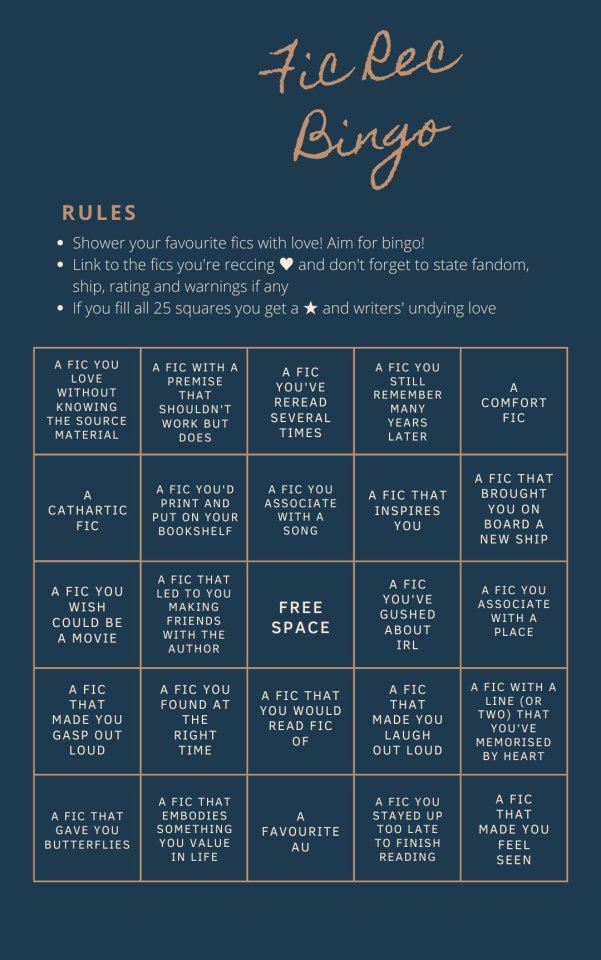
I saw this making the rounds on Twitter and decided I’d like to try it (mostly because I enjoy going back through my list and reminiscing about the ones I love but haven’t read in a while), but didn’t feel like Twitter was the best place to post mine. I’ve got both Dreamwidth and Pillowfort, but I haven’t really used them. This is probably the kind of thing that should go there, so maybe I’ll post it there, too. We’ll see.
Anyway, I only read in four fandoms, so maybe my recs will be boring to most people. But they’re good stories, and maybe there are even some people out there who haven’t read them.
I don’t expect any reblogs or anything, but maybe people will see it and decide they’d like to take part, and then there will be more fic recs out there making the world a better place.
I put them under a cut because the descriptions and stuff take up so much space.
1. A fic you love without knowing the source material
Take the Pieces and Build them Skywards by quarterturn
Bandom ** Frank/Gerard ** 44,816 ** Explicit ** Character Death
Gerard's not happy with his life, but that doesn't mean he's particularly thrilled when he wakes up dead. To add insult to injury, he finds out that instead of crossing over, he's been chosen to join the ranks of the grim reapers. Things get more complicated when he falls for one of the living, a waiter named Frank Iero. And just when everything finally seems to be falling into place, Frank's name shows up on the list of souls to be reaped. Loosely based on the TV show Dead Like Me.
I don’t know anything about the TV show Dead Like Me; when I first read this fic in 2009, I had never even heard of it. I’ve wondered since then if I like it even better because I don’t know anything about the source material, but I’ll never know.It made me laugh and cry; it’s an emotional roller coaster, and I love it.
2. A fic with a premise that shouldn’t work but does
An Inexplicable Occurrence of Angels by stele3
Bandom ** Frank/Gerard ** 35,192 ** PG-13 ** No Warnings
I've messed with the band timeline, clearly. This is set in summer of 2005... but it ain't the Summer of Like. This is a story about second chances and gutting through your own failures, but never letting them defeat you. Take that, bitches.
Frank (Frank!) is a literal angel, okay, but there is not a thing I don’t love about this story. It’s angsty but still manages to be cute and charming as fuck, and the characterization is great.
3. A fic you’ve reread several times
Seeds by thesardine
Sherlock ** Gen, supposedly ** 5,475 ** PG-13 ** No Warnings
In a fit of boredom Sherlock plants some seeds, may or may not eat one cracker, and definitely waxes dramatic on the sofa for a while.
Sherlock struggles with a bit of depression caused by boredom, and accidentally discovers a hobby he slowly learns to allow himself to enjoy. I love this a lot; the author takes us into Sherlock’s headspace, so you’re painfully aware just how much he needs a distraction, and how much better off he is with John in his life.
4. A fic you still remember many years later
In Care Of by Fangs_Fawn
Harry Potter ** Gen ** 45,319 ** PG-13 ** Child Abuse
During the summer before sixth year, Harry finds an injured bat in the garden and decides to try to heal it...and an unwilling Snape learns just what kind of a person Harry Potter really is.
Between the Dursleys getting what’s coming to them, and the redemption of Harry, Snape, and Dumbledore in each others’ eyes, this story has really stuck with me through the years.
5. A comfort fic
Nature and Nurture by earlgreytea68
Sherlock ** Sherlock/John ** 203,273 ** Mature ** No Warnings
The British Government accidentally clones Sherlock Holmes. Which brings a baby to 221B Baker Street.
Thousands of words of fluff. Literally. There’s not a lot of conflict in this story, which makes it a great comfort fic when your mind is too busy or real life is too depressing.
6. A cathartic fic
The Quiet Man by ivyblossom
Sherlock ** Sherlock/John ** 157,369 ** Explicit ** No Warnings
"Do you just carry on talking when I'm away?"
Post-Reichenbach John is walking the line between fantasy and reality, choosing to stay with the Sherlock in his head rather than deal with the reality where he no longer exists. He eventually manages to attempt a normal life, but he’s bored and basically sleepwalking through his days, so when Sherlock finally reveals himself, it’s the best kind of relief. They go after the last remnants of Moriarty’s web, in hopes of a second chance at the life they should have had together.
7. A fic you’d print and put on your bookshelf
Saving Sherlock Holmes by earlgreytea68
Sherlock ** Sherlock/John Mycroft/Greg ** 139,494 ** Mature ** Underage
Okay. So. This was literally supposed to be, like, three or four chapters as a prologue to the show. Sort of a "what happened in the Holmes childhoods to make them the way they are today." That's why it's set in the time period it is, because I thought I was eventually going to leave them to go on to the show. And then...I got a bit carried away and thought, Here I have established the two young Holmes boys. Now what happens if, instead of making them wait twenty years, I give them everything they need to fix themselves right now? Forty-three chapters later, you have this story.
To be honest, I would like to have most of my favorite fics in book form, with actual pages, that I could pluck from my actual shelf and sit and read without the glare of a screen between us. But I do enjoy the feel of this story, and I do believe it would make a good actual book.
8. A fic you associate with a song
Unholyverse by bexless
Bandom ** Frank/Gerard ** 186,764 ** Explicit ** Violence & Character Death
“He thinks I have stigmata,” Frank said, because what the fucking hell, it couldn’t get any worse. He might as well just lay it out.
“Oh, well,” said Brian into his hands. “Of course.”
Every time I so much as think about this series, MCR’s Heaven Help Us starts playing in my head.
9. A fic that inspires you
Turn by Saras_Girl
Harry Potter ** Harry/Draco ** 306,708 ** Explicit ** No Warnings
One good turn always deserves another. Apparently.
Frankly, I love every single thing this author has ever churned out, but this one is my very favorite. Harry gets a glimpse into what his life could have been, and a chance to make big changes he desperately needs.
10. A fic that brought you on board a new ship
So, So Fucked by Anonymous
Bandom ** Pete/Patrick ** 12,565 ** Mature ** No Warnings
Pete accidentally "outs" himself and Patrick on Good Morning America. Only problem? They're not gay. What now?
I was reading strictly in Harry Potter at the time, and wasn’t interested in bandom at all, but my best friend was doing betas for someone who was writing in bandom, and she ended up getting into it and then wrote this one, and kept calling me about it to bounce ideas around, and the story was so cute, and Pete and Patrick were so cute, and I suddenly found myself totally invested. Honestly I think it may have been one of the best things that ever happened to me.
11. A fic you wish could be a movie
The Anatomy of a Fall by novembersmith
Bandom ** Frank/Gerard ** 107,525 ** Explicit ** Violence & Character Death
The unholy union of a high school AU and a ghost story. Gerard's life takes a strange turn when his family moves to a small town in Vermont and he discovers the locals aren't all what they seem to be. Also includes: unexpected nature walks, murder, pining, improper treatment of crime scenes, a number of bone-related puns, high school bullies, and a short-range shrub named Ferdinand.
This story has excellent imagery that I think would work really well on the big screen. Plus I can’t even hear the name of it without my heart doing flip-flops.
12. A fic that led to you making friends with the author
Seven ficlets for Valentine’s Day Part VII by RedOrchid
Bandom ** GSF ** 1,042 ** Mature? ** No Warnings
Panic-as-cleaning-equipment-AU Valentine's Day GSF.
I technically don’t have a fic for this bingo square, but this one comes close, I guess. The author was already in my larger circle of friends, but we didn’t actually talk to each other? She wrote this crack ficlet around the same time we started talking to each other more, and I still vividly remember it because of the genius involved in turning band boys into literal cleaning equipment. The line “Ryan bristled” has stuck with me to this day.
13. free space
Elf ‘Verse by mokuyoubi
Bandom ** GSF ** 103,247 ** Explicit ** Underage
Modern AU where Ryan is a famous poet, and he and Spencer are fiercely private and insular and stupidly co-dependent until Jon shows up and effortlessly breaks down all their walls.
Or
Wherein Brendon and Frank are Christmas elves who, inspired by Will Farrell movies, venture into the real world to become rock stars. Or something of that nature.
I’ve got a lot of love for this universe for various reasons, but it’s also fun and heartwarming and honestly, I don’t really need anything else.
14. A fic you’ve gushed about irl
Harry Potter and the Battle of Wills by Jocelyn (and her mum)
Harry Potter ** Mostly Gen ** 137,385 ** Basically PG-13 ** Character Death
Harry mourns his godfather as the war finally begins in earnest, bringing tragedy and new struggles for all those on the side of Good. If they hope to win, all quarrels must be set aside, new alliances must be forged, and Harry Potter must find the courage to face down dark wizards, his own emotions, and a destiny he did not choose. Snape blows his cover as a spy to save Harry from Voldemort.
This begins after Order of the Phoenix, and the story and characters read more like canon than any other HP fic I’ve read, so because of that and because it’s so, so good, I like to rec this one to people who are new to fandom.
15. A fic you associate with a place
Stately Homes of Wiltshire by waspabi
Harry Potter ** Harry/Draco ** 57,582 ** Explicit ** No Warnings
Malfoy Manor has mould, dry rot and an infestation of unusually historical poltergeists. Harry Potter is on the case.
Wiltshire! I’ve never actually been there, but this author is really good about details. The story is also lovely and funny.
16. A fic that made you gasp out loud
Home is a Name by Arsenic
Bandom ** Frank/Gerard ** 39,314 ** Explicit ** No Warnings
MCR Clinic of Love. Companion fic to Wednesday Night Boys.
Okay, so this one is actually a sequel, and the first installment, Wednesday Night Boys, should 100% be read first. It must be said, though, that while the sequel doesn’t have any warnings, Wednesday Night Boys is about the Panic! kids as prostitutes, and has warnings for graphic violence, rape/non-con, and underage sex. The MCR guys work at the free clinic, and Home is a Name focuses on them. They’re honestly both gorgeous stories.
17. A fic you found at the right time
real or not real by thearkdelinquents
Anne with an E ** Anne/Gilbert ** 11,587 ** PG ** No Warnings
“I could do it.” Gilbert said, looking straight ahead.
Anne stopped. “What?”
He turned to look at her; they were just outside Green Gables now. “I could do it. I could court you.”
“What- We- You- I- You don’t like me like that.” Anne sputtered.
Gilbert smirked at her. “Well we could pretend. I could court you and be your fake boyfriend.”
For one of the few times in her life, Anne Shirley-Cuthbert was speechless.
-
a fake dating fic but it's basically just a shirbert To All The Boys I Loved Before au.
I really, really loved Anne with an E. When the final season was released, I spent a weekend binge-watching the entire show, and then it was over and I was bereft, so I decided to see what was available on Ao3, and I found this, and it was exactly what I needed. And now I have another fandom.
18. A fic that you would read fic of
Left by lifeonmars
Sherlock ** Sherlock/John ** 45,153 ** Mature ** No Warnings
John Watson is left-handed.
He’s tried not to let it affect his life, but as any Lefty knows, that’s almost impossible.
In this universe, all right-handed people have some kind of power, or ‘knack’, most of which are mild and easily categorized. Sherlock’s is rare and believed to be the only one like it in the world. John is left-handed, part of the 10% of the population without a knack. I would read all kinds of fics of this fic.
19. A fic that made you laugh out loud
What to do When Your Flatmate is Homicidal by hyacinth_sky747
Sherlock ** Sherlock/John ** 58,650 ** Explicit ** No Warnings
Sherlock takes Molly's advice when dealing with his dangerous flatmate.
Heartwarming and hilarious. I laughed a lot.
20. A fic with a line (or two) that you’ve memorised by heart
A Necessary Requirement by Bexless
Bandom ** Frank/Gerard ** 3,759 ** Mature ** No Warnings
Right, here is the extremely silly storylet I wrote BY HAND on holiday. On PAPER. With a PEN. My god. The things I do when I'm separated from my beloved net. It is set during the Summer of Like (Warped '05, for those of you who don't know) and is basically a product of my reaction to various pictures of Gerard groping himself on stage, which led to me obsessing about his dick and what it might look like. As usual, I chose to work this obsession out through Frank.
This fic could have gone to multiple other squares, but I am not usually the kind of person who can quote lines from things, and I have many lines from this story committed to memory. I’ve read it multiple times, because I read it every time I need a pick-me-up or a good laugh. Or if I’ve read something scary and I need something lighter before I can actually get up and move around my house...
21. A fic that gave you butterflies
Pretty Much A Sex God by adellyna
Bandom ** Spencer/Jon ** 3,985 ** PG-13 ** No Warnings
Jon and Spencer’s first date.
The Jon in this story is so soft and warm and fluffy and his character makes my heart and stomach do weird things.
22. A fic that embodies something you value in life
A Marauder’s Plan by CatsAreCool (Rachel500)
Harry Potter ** Harry/Hermione ** 865,520 ** PG13 ** Violence/Death/Underage
What if Sirius decided to stay in England and deliver on his promise to raise Harry instead of hiding somewhere sunny? Changes abound with that one decision...
ALSO
Harry’s New Home by kbinnz
Harry Potter ** Gen ** 318,389 ** PG-13 ** Abuse
One lonely little boy. One snarky, grumpy git. When the safety of one was entrusted to the other, everyone knew this was not going to turn out well... Or was it? AU, sequel to "Harry's First Detention".
In these two stories, Sirius and Severus throw everything they have into creating the best possible world for Harry, as he is their number one priority, because that is exactly how parenthood should be.
23. A favourite AU
Performance In a Leading Role by Mad_Lori
Sherlock ** Sherlock/John ** 156,714 ** Explicit ** No Warnings
Sherlock Holmes is an Oscar winner in the midst of a career slump. John Watson is an Everyman actor trapped in the rom-com ghetto. When they are cast as a gay couple in a new independent drama, will they surprise each other? Will their on-screen romance make its way into the real world?
This has got quite a bit of schmoop, which isn’t usually my thing, but this story is so, so good, and I always love stories that describe Sherlock realizing and appreciating how extraordinary John is.
24. A fic you stayed up too late to finish reading
Collared by VelvetMace
Sherlock ** Sherlock/John ** 83,028 ** Explicit ** Violence & Rape/Non-Con
In a world where the British Empire is still strong and slavery is her economic backbone, John has become a terrorist for the abolitionist movement. He is caught by Mycroft, enslaved, and given to Sherlock for training. The goal: To test a new kind of slave collar with the power to break even the strongest willed fighter. One that will make even John learn to love being a slave.
Dubious consent, and humiliation. I remember staying up very late reading this one, even though I had to work early the next morning. I just couldn’t put it down.
25. A fic that made you feel seen
Buy Handmade by jjtaylor
Bandom ** Frank/Gerard ** 18,755 ** Mature ** No Warnings
He knows something else is going to happen; his life isn't always going to be this. He just doesn't know what has to happen for that change to come, for him to wake up and become an artist with an Etsy page and a home studio, and to never have to see a cubicle again.
This is the story of my heart. I have felt Frankie’s feelings and thought his thoughts, and I love that he does something about it, and I love Gerard so, so much. I first read this in 2009, and my love for it has never wavered. I could have used this one for a good half of the bingo squares, but it’s the only one that could go here.
2 notes
·
View notes
Text
Sherlock Holmes and Fanfiction: A Study in the Development of Humanity
August 17, 2019
Along with having a Zygoma that would make a cheese knife jealous, Benedict Cumberbatch marvelously portrays the fictitious, and often socially blind, detective created by Sir Arthur Conan Doyle and is brought up as one of the many iterations of Sherlock Holmes. Whether you prefer the serious only-time-for-fun-when-I-drank-to-much, Cumberbatch and Freeman as Sherlock and Watson respectively, or favor Robert Downey Jr. and his Watson, Jude Law’s more comical approach, you have seen at least one version of the duo represented on-screen that is different from their literary counterparts; Which is anything but surprising, as it is a series of shorts that were written in the 1880s. Some laugh at the idea that fan-made fiction is an artifact of pop culture, but every story is inspired by another story. Even the original stories are often based loosely, stiffly, or satirically around witnessed events. Fanfiction is a study in humanity, and it's social and historical developments. It also brings out creative thinking, individually and collectively.
What makes writing stories using Sir Arthur Doyle’s characters on a platform such as Wattpad (or Tumblr) less accepted than a BBC or Hollywood production? It does not matter where the source material comes from; the original idea will be spun into someone's inspiration. The amount of research and work that goes into a good fanfiction should be commended as well, as writers can spend hours researching methods or mental incapacities. Then again, "good" is a subjective term, and you can often tell when something isn’t thoroughly researched. Even with films, tv shows, and big, commercially marketed books, there is an argument over whether the story is good or bad. While some consider fan-written fiction lower than kitsch, being a mimic is a skill. Yes, some of the characters are already established, but the writer still created an original character- or characters- and plot ideas, which means the story already has a new element added and they now must create interactions with the pre-established characters without disrespecting the constitution of the original characters or their creator. Whether the original creator would accept the fans version of the story matters little, as both versions are the author’s head canon. As with any form of art, kitsch or not, it will enviably cause controversy.
Cumberbatch's portrayal of Sherlock Holmes is the updated inspiration presented by Mark Gatiss and Steven Moffat. To be more relatable to a broader audience, Holmes, Watson, and Moriarty are younger, and electronically inclined but still clever enough to keep the “old-timers” interested. As times change, more ideas are allowed. The mental health of it all has developed as well; the more scientists learn about mental wellness and the human psyche, the more we can be algorithmic with how characters will or won’t react to different disorders. Sally Donovan calls Sherlock a freak, John Watson rolls with it, and Detective Lestrade sees Sherlock’s potential.
While there is little exploration as to why Downey Jr’s Sherlock Holmes is the way he is, looking at it from a psychological point of view, we can identify the adolescent issues that caused Cumberbatch’s Sherlock to have grown into the man he is. Nothing sums up young Sherlock’s development more than “the mind is inherently designed to understand life as a narrative.” (Borges, 1962) Even Sigmund Freud agrees that the psyche reshapes the conflicts revisited in narratives as a way to cope (Danesi, 2019). In Gatiss’ version, the Holmes brothers have a younger sister. She was closer to Sherlock’s age and began to feel ignored and jealous of Sherlock’s relationship with his best friend Victor, so she shoved Victor down a well and refused to tell them where he was. It is not until after she burned down the family home and is sent away that Sherlock rewrites his memories, forgetting his younger sister and making his childhood friend his childhood dog, (that never existed), Redbeard. At one-point, Mycroft tells Sherlock he is the man he is because of the memory of his sister.
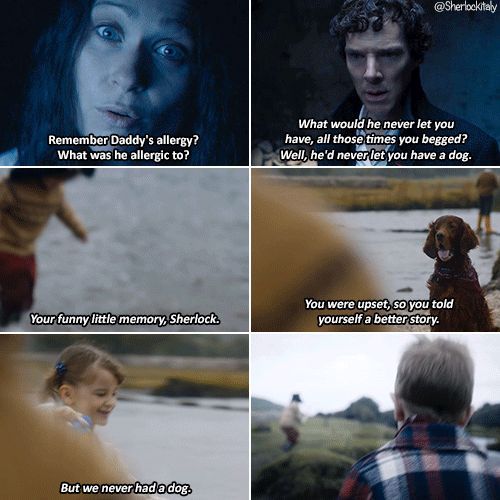

The same events also lay the foundation for understanding Mycroft as well. The human psyche is a precious thing. Where Sherlock forgot his trauma, and his brain seems to have rewritten the way he reacts completely, Mycroft lives with the guilt of knowing what he did. He knew the Eurus was locked away and did not die in the house fire she set, as he told his family. Perhaps his internalization of emotions is how he lives with the guilt, like a self-inflicted punishment. The more you pay attention to Gatiss as Mycroft, the more you can tell he truly cares about his little brother, but he is afraid to look weak, so he instead acts like he does not and allows the hostility.
Inspirations grow with the times. More ideas are accepted, and technology is upgraded. While Cumberbatch’s Sherlock Holmes occasionally falls back into archaic tendencies, he uses modern technology such as keeping a blog and texting. Downey Jr. offers us the closer to the original version with telegram communications. Setting aside the Abominable Bride episode which is meant to take place in 1895- it is likely that if the two versions were to switch places, they would not be able to do their job as efficiently, if at all. They wouldn’t have the technology they know how to use; one would have the advanced tech while the other would think waiting for, or writing, a telegram is tedious.
When studying Pop Culture, we must recognize that linguistics and logistics have changed to sate modern speech and society. “The game is afoot” becomes “the game is on.” Texting and calling someone on their mobile phone became the new telegram and messenger correspondence. Phrases like “brother mine” and “blud” are granted between the Holmes brothers to show affection, even if it is sarcastic. There is a scene between Detective Inspector Lestrade and John Watson where Lestrade tells John that Sherlock is a great man and that maybe one day he will be a good one. (Moffat et al. 2010) Which implies that Sherlock is good at what he does, but not the kindest person. It is this scene that tells the viewers that if Sherlock were less talented but compassionate, he would be a good person.
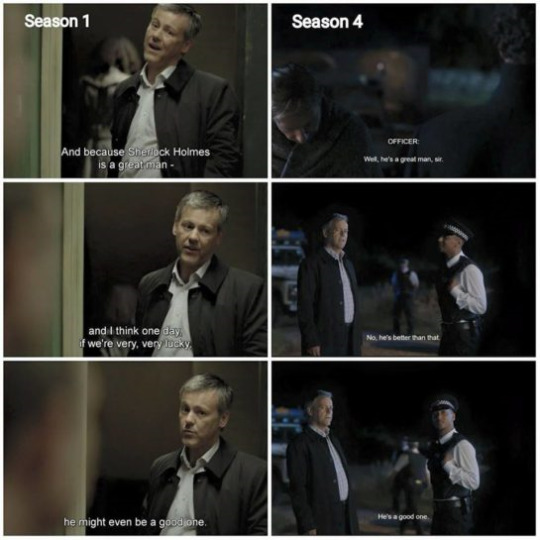
The good man speech is alluded to in the third episode in the fourth series when Sherlock shows genuine concern for his brother and even addresses Lestrade by his correct first name, indicating character growth. That humanizing character growth is what gives Benedict Cumberbatch’s Sherlock an appeal that Robert Downey Jr.’s version does not have. It also suggests that Cumberbatch’s Sherlock pays attention but chooses to goad their disdain deliberately, thereby making moments like that more precious.
What was it Carl Jung said about mischief? “In every person, there exists a predilection for puerile mischief.” (Dansei, 2019) So In a way, this incarnation of Sherlock Holmes is The Hero and The Trickster. He also has more than one form of the shadow he is dealing with- the shadow within himself, and the shadow that takes the form of cases and enemies. When considering Sherlock, a “trickster,” we must look past the usual villainy that is partnered with the mythology. His trickery comes from his lack or denial of social skills. In the second episode of the first series, The Blind Banker, Sherlock allows himself to be contradicted to move his case along. He also tends to use physically harmless manipulation when a case is involved. In that same episode, there is a scene with Molly Hooper that illustrates this action. Though non-cannon to Sir Conan Doyle’s original work, she is a specialist registrar, (intern), in the morgue at St. Bartholomew’s Hospital that Sherlock flirts with Molly to gain access to bodies in the morgue without having to go through official channels. He recognizes her affection for him and manipulates that. However, he has never intentionally been cruel to his tolerable affiliates. That is where he differs from the usual trickster mythologies.
When Mark Gatiss and Stephen Moffat created their version of Sherlock Holmes, it was not your twelve-year-old-girl-who-doesn’t-understand-the-dimensions-of-the-characters, fantasy. They cared about the characters and enjoyed the adventures of the detective so much growing up they wanted to create their own version., and that admiration demanded the creation of a beautifully magical world that transcends the archaic and challenges the archetypes. There are even liberties taken with John’s wife, Mary. As she does not have a detailed back story in the original work, she is probably the most natural character to build around. She could have been a ‘villain’ or ‘the wise old Oak’ that helps John in ways Sherlock can’t. Which takes us back to the role’s women play throughout history and anthropology.
Pop Culture can be considered an experiment and expression of postmodern democracy, and as with any other viewpoint, it is not shared universally (Dansei, 2019). This democracy and societal growth are evident in the way BBC’s Sherlock portrays Mary Watson as a strong, independent, and charismatic woman who enjoys the eccentricities of Sherlock Holmes. She even understood why he faked his death. Since the beginning, she has been in his corner and pushed the relationship between John and Sherlock to stay the same. It was not until later in the series that we find out why she is so accommodating. Where Guy Ritchie’s Sherlock Holmes shows us Mary Watson as ‘John’s soon-to-be-wife, who happens to be a governess,’ Sherlock shoves the progression in our faces.
Historically, women have been submissive; to be seen and not heard. 2009’s Sherlock Holmes movies played by Robert Downey Jr, there is the implication that women are second-class citizens and not often taken seriously, which allows the deception between Ms. Adler and Mr. Holmes. While she was using him for information, he was using her for creature comforts. It was not proper to openly discuss sexuality or lack thereof. The audience doesn’t even know how or when Sherlock Holmes met Irene Adler in this ideation. However, Mark Gatiss and Steven Moffat challenge their audiences with a polar opposite character in their version of Irene Adler. She is an open and marketed Dominatrix, which accepts that women can take charge of their own life. In the wake of movements like #HeforShe and #Mettoo, Laura Pulver gives us the power to challenge inequality and harassment.
As previously mentioned, Molly Hooper is a character of merit in the BBC world of Sherlock Holmes. However, there is no place for her in Sir Arthur Conan Doyle’s works. The idea of women being in a power position like that was outside of comprehension in the 1880s. There is some subjugation with Molly accepting the way Sherlock treats her, but she is smart and influential and respected. Her education in the medical field illustrates how society has grown. Women can study more than the necessities for being “Susie Homemaker.” Molly is Sherlock’s access point to bodies and labs in the hospital. Her allowing him access to the hospital helps him solve the crimes without breaking more laws himself by breaking into the morgue. He will never admit it, but she helps keep him human and occasionally inspires ideas with her medical perspective. It also helps that she is not “a complete idiot.”
While the drug use seems to be a staple in the Sherlock Holmes lore, Benedict Cumberbatch’s Sherlock doesn’t drink eye drops to get high when he can’t find substance. He also isn’t trapping flies under a glass container and plucking the violin to observe their reactions. This version of Sherlock Holmes also portrays scientific advancement outside of women now contributing. It is mentioned in the show the Sherlock is a graduate chemist, and he is often seen appropriately using a microscope and slides when testing drops of blood and chemical compositions. There will always be new scientific methods and discoveries. The microscope and sterile slides are scientific improvements that were needed to help science move forward. The best science starts with a sterile environment. Sherlock even enjoys experiments with microwaves and refrigeration, implying that he is monitoring the viability of a subject in various temperatures, and the bacterial reactions as well. Though there were refrigeration units, the microwave experiments would not exist unless he was to first invent a unit to conduct and control microwaves.
Some of the experiments are used to solve current cases, while others are entertainment because he is bored. He is meticulous with his work and can even identify 140 different types of tobacco ash. Another thing that has grown with over the years is the knowledge of chemical reactions. The scientific advancements shown to audiences with any Sherlock Holmes variation seem to live with the memories of Sir Conan Doyle’s own growing up in the era of scientific change. Some, such as BBC’s version, highlight the advancements, some stay stagnant, but the impact is still there, whether it is a history in science lesson or scientific progress that inspires new ideas. Each version of Sherlock Holmes has a certain cleverness to it. New ideas in science, intelligent women, even annoyingly clever criminals. Every release is another piece of the puzzle, a collaborative art form that feeds on societal growth, innovation, and invention while somehow keeping our history present.
In general, Sherlock on the BBC gives more humanity and dimensions to the characters. Character building is a skill that many take for granted. World-building is two steps beyond that. But to take old-fashioned characters and throw them forward in history is taking that challenge and upping the ante. Both versions illustrate how much humankind has changed over the years, but also how we stayed the same. We’ve always been creative beings, and while Robert Downey Jr. was not afraid to don a dress and bonnet (which offered him anonymity as a woman), Cumberbatch takes a different approach to the “hide in plain sight” idea. Creative difference, but just as effective. Whether our creativity comes from something manmade or our own ingenuity, we never grow out of it, just develop it.
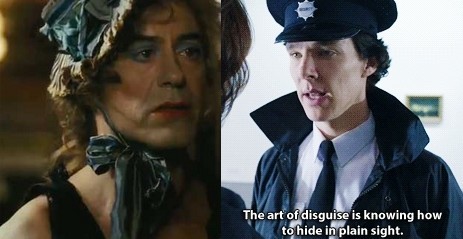

#cumbercollective#cumberbatch#downeyjr#sherlockholmes#fanfiction#fanculture#humangrowth#humanity#popcultureandhumanity
13 notes
·
View notes
Photo
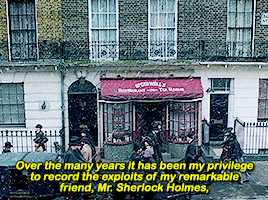
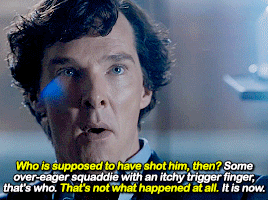
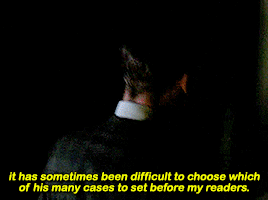
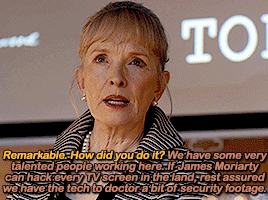
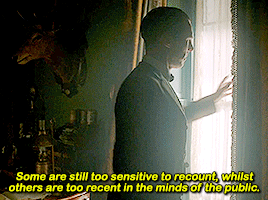
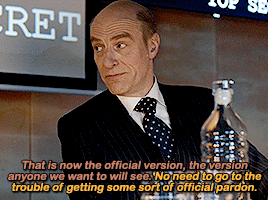
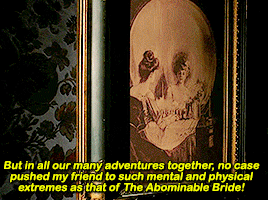
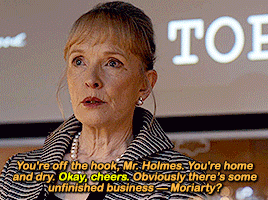
Looking Closer at How The Abominable Bride Foreshadowed and Can Be Used to Chronologically Decode Series 4:
In the opening of TAB, Sherlock imagines John narrating how as Sherlock’s biographer he picks and chooses which of his cases to present to the public, alluding to the nature of John as an unreliable narrator in the canon.
In the opening of TST, John writes Lady Smallwood and co. talking about modifying the footage of Sherlock shooting Magnussen and that their story will become the official one, setting up the nature of John as an unreliable narrator in series 4.
[Continue below the cut for more ➤]
See also: 10 Revealing Things From The Six Thatchers That Haunt You Late At Night, 10 Revealing Things From The Lying Detective That Haunt You Late At Night, and 10 Revealing Things From The Final Problem That Haunt You Late At Night. (#tw suicide)
Bonus: They’re not there:
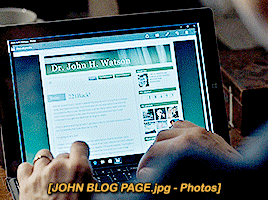
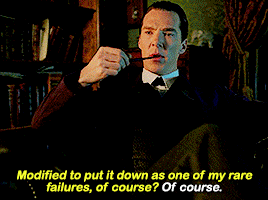
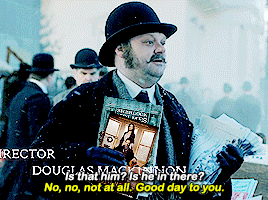
On John’s blog, he wears his heart on his sleeve. He adores Sherlock and clearly loves him even when he tries to downplay their relationship or play up his relationship with Mary. In his post about meeting Sherlock, he calls him “strangely likeable”, and talks like there’s life in for the first time in ages after multiple blog posts about how nothing happens to him.
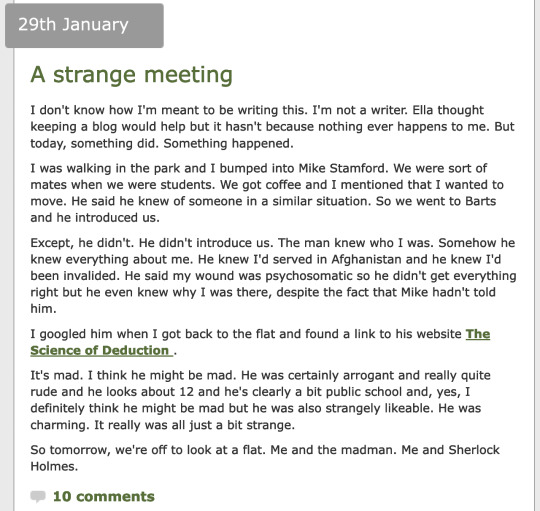
This includes how John thinks that Sherlock not only doesn’t love him back, but that he’s “spectacularly ignorant” about some things, including the way that he feels about Sherlock. How does the world’s only genius consulting detective not notice that? John is pretty forward about this is in one of his early blogs and first one about Sherlock’s cases.
He also says for the first time that he has to omit certain things in order to publish the story at all, echoing the nature of the original stories.
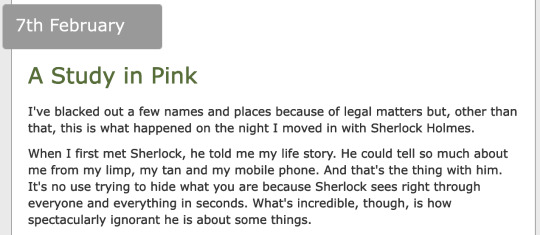
But Watson doesn’t say this in the opening of A Study In Scarlet; he straight-forwardly talks about his return from overseas and his meeting Sherlock Holmes, followed by the case that changes his life. It’s really in the other stories that Watson talks more about altering details, which is what the debate around his authorship revolves around.
It does provide an interesting comparison, though, the way that Sherlock hasn’t yet become the emotionless machine that the myth surrounding Sherlock Holmes is so obsessed with. He laughs, he dances, he expresses emotion alongside his deductions. The last line about Sherlock actually says, “Didn’t I tell you so when we started?” cried Sherlock Holmes with a laugh. “That’s the result of all our Study in Scarlet: to get them a testimonial!”
That changes with The Sign of Four. The opening of the second novel, following the success of the first, is about Holmes and Watson talking about the publication of their first case together.
Holmes: “Yes, indeed,” said I, cordially. “I was never so struck by anything in my life. I even embodied it in a small brochure with the somewhat fantastic title of ‘A Study in Scarlet.’ ”He shook his head sadly. “I glanced over it,” said he.
Holmes: “Honestly, I cannot congratulate you upon it. Detection is, or ought to be, an exact science, and should be treated in the same cold and unemo-
tional manner. You have attempted to tinge it with romanticism, which produces much the same effect as if you worked a love-story or an elopement into the fifth proposition of Euclid.”
Watson: “But the romance was there,” I remonstrated. “I could not tamper with the facts.”
Holmes: “Some facts should be suppressed, or at least a just sense of proportion should be observed in treating them. The only point in the case which deserved mention was the curious analytical reasoning from effects to causes by which I succeeded in unraveling it.”
Watson: I was annoyed at this criticism of a work which had been specially designed to please him. I confess, too, that I was irritated by the egotism which seemed to demand that every line of my pamphlet should be devoted to his own special doings. More than once during the years that I had lived with him in Baker Street I had observed that a small vanity underlay my companion’s quiet and didactic manner. I made no remark, however, but sat nursing my wounded leg. I had a Jezail bullet through it some time before, and, though it did not prevent me from walking, it ached wearily at every change of the weather.
As Sherlock Holmes becomes more of a text, the more Watson mentions about how he to change names, dates, details, or wait until certain people are dead until his stories are published, to protect international secrets and the lives of its characters. But it all started with Holmes and Watson in a flat, talking about how the romance should be suppressed.
In one of John’s early blogs he mentions a fortune cookie at the end, pulling a quote from The Valley of Fear:
“Everything comes in circles—even Professor Moriarty. Jonathan Wild was the hidden force of the London criminals, to whom he sold his brains and his organization on a fifteen per cent. commission. The old wheel turns, and the same spoke comes up. It's all been done before, and will be again. I'll tell you one or two things about Moriarty which may interest you.”
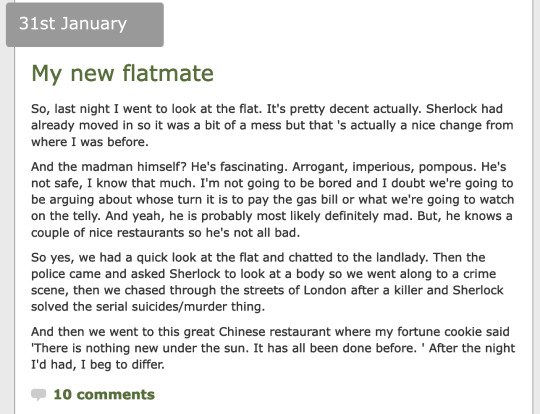
Except John says he think it’s going to be different this time. This version is going to do something different before. It’s going to admit that the romance was there. It’s not going to suppress it anymore by the end. But before it gets there, the story is also about how much, and what therein, the story is being altered in the first place. Enter series 4.
An important blog entry to understanding the mindset of Sherlock and John after series 3 is the last blog entry. To date, the blog is still suspended because if it continued the true nature and mystery of series 4, the answer would be spoiled.
It reads as follows:
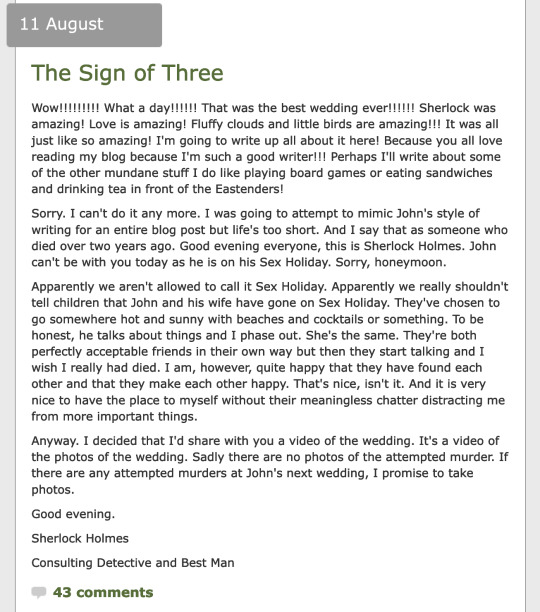
Sherlock is openly disinterested and angry at the wedding to anyone who’s paying attention. And not without reason.
The ending of TSOT is one of the most devastating moments in the show. John and Sherlock both realize that neither of them wanted this marriage to happen, that they could have been together and in this passing look they know it’s moments too late after Sherlock realizes Mary is pregnant.
It happens and disappears in a moment.
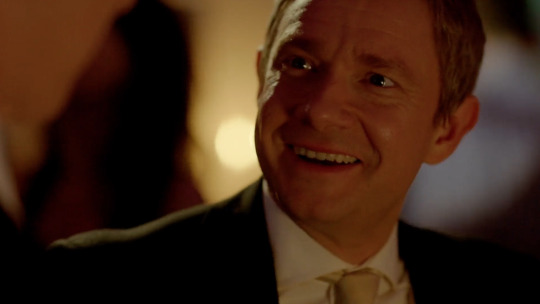
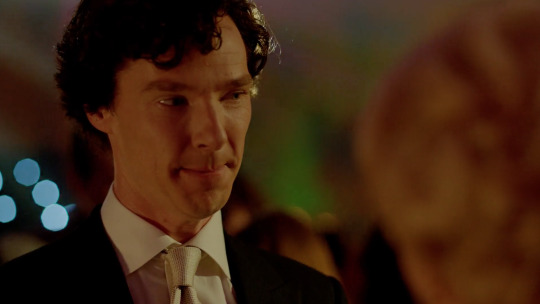
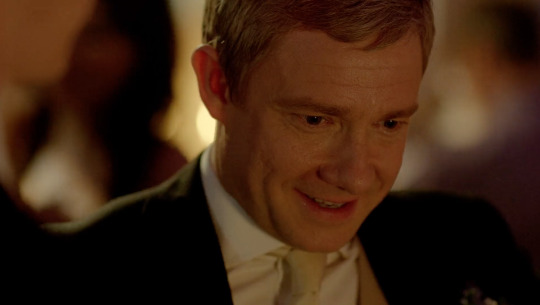
Sherlock leaves the wedding early. A month and one honeymoon later, John will be bursting to get out of his trainwreck of a marriage at every waking moment. He’ll bike to work. He’ll keep his bags packed. When he rejoins Sherlock in the flat he’s practically giddy, and then when he meets Janine and Sherlock explains that he used her later, he’s right back at wondering if Sherlock is capable of loving anyone or not.
And none of this is remotely mentioned in the blog entry. Sherlock takes over for John, foreshadowing that the next act of the show is about to retell The Casebook of Sherlock Holmes, which includes two stories entirely narrated by Holmes. HLV is one of the most devastating episodes of the show and it’s not on the blog at all. The public doesn’t know anything about what happened to them.
The next time we see John’s blog it’s going to say this. Absolutely nothing about their time gone, what Sherlock did or what John is going through. Of course, nothing about Mary either. He isn’t even typing anything like normal; he just fidgets his two fingers on the same two keys, and his blog isn’t on the screen. It’s a screenshot. Because what we’re watching is the blog itself.
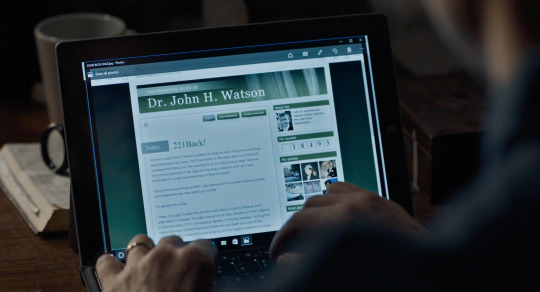
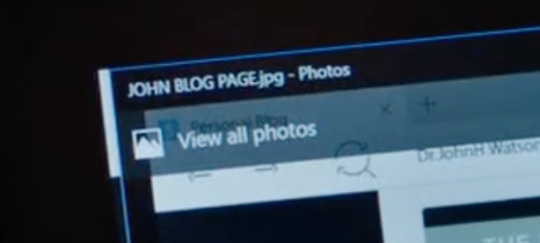
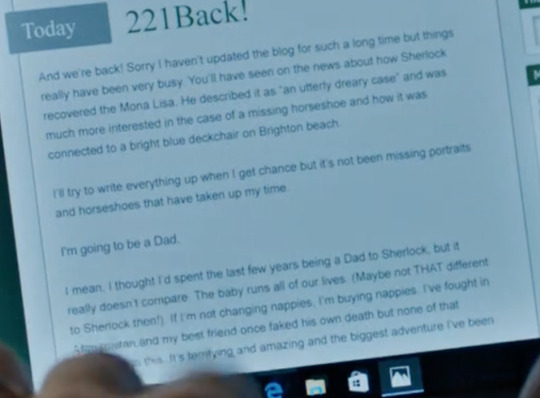
So the parallel starts thus:
After setting up his dream world and arriving at 221B Baker St., and a conversation with Mrs. Hudson about the way that John modifies people to be characters in his story, Sherlock imagines John giving the following narration
Watson: Over the many years it has been my privilege to record the exploits of my remarkable friend, Mr. Sherlock Holmes
The beginning is about putting up the front of John’s purpose and their relationship, calling Holmes his remarkable friend. In the next episode, John as the author takes liberties of his own in order to protect the people in it. He protects himself and Sherlock by covering up the true events of Mary’s death.
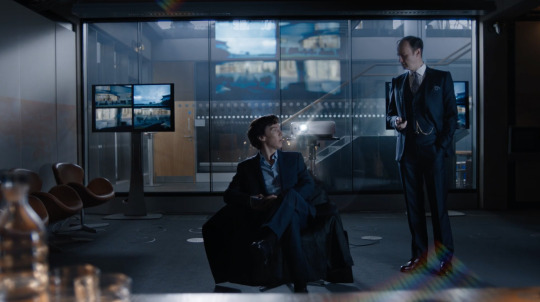
In TST, the opening scene is about doctoring the footage of Sherlock shooting Magnussen. With a bright projector light behind Sherlock’s head, the footage cuts out Sherlock putting the trigger as someone walks past the camera. This is being displayed as top-secret information as all of them sit inside a glass window room anyone could sit through.
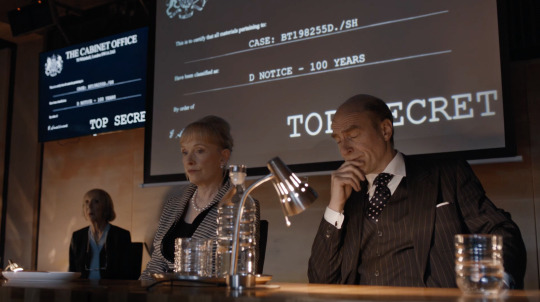
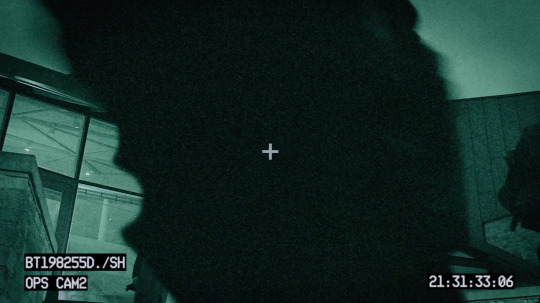
Sherlock and Mycroft describe how it’s different:
I see. Who is supposed to have shot him, then?
Some over-eager squaddie with an itchy trigger finger - that's who.
The over-eager shooter in this story has already conveniently been placed in the room. She has her own pen and paper, but isn’t writing anything down, which is her job as a secretary. It’s because a copy of that text, this conversation should exist, but it doesn’t, because Norbury doesn’t exist. Mycroft tells her not to write it down and put down it down, because once they’re beyond these walls, they must “never speak of it.” There’s also the meaning of Mark Gatiss being a stand in for the show’s writers, similar to the meaning of when John finds the dog’s bones, a correlation to Emelia Ricoletti’s grave being a switch.
It also creates a connection between John the author and Norbury. She’s the one with the pen and she’s going to take the fall, but John is the one who really shot Mary.

Back in TAB, John continues about how he picks and chooses cases to tell:
Watson: it has sometimes been difficult to choose which of his many cases to set before my readers.
That includes, as far as we know right now, the entirety of HLV. He leaves out Magnussen, Mary shooting Sherlock, Mary’s past, and Sherlock shooting Magnussen at once. It’s not just about the cases though, it’s about other things that John leaves out of his story.
In Sherlock’s mind: it’s not just smaller things that John says, like Sherlock being “spectacularly ignorant” about certain things and wounding his ego or embarrassing him, it’s that John never picks up on how much Sherlock loves him. John is hiding the true nature of their relationship from the world because he doesn’t see all the deductions of how much Sherlock loves him back.
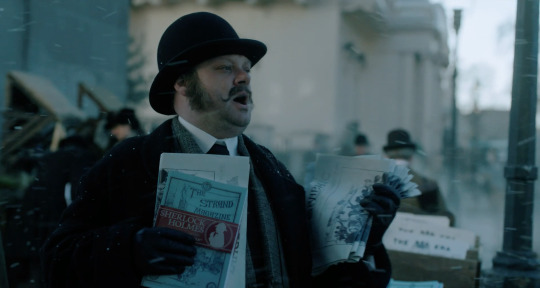
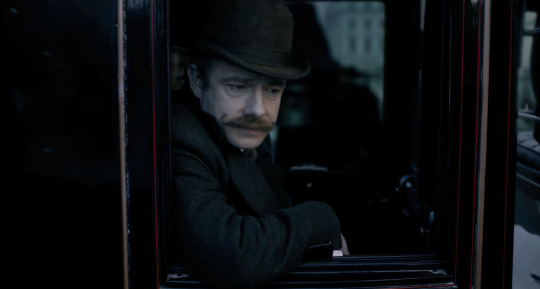
Immediately after the credits in TAB John is praised by for the success of the Adventure of the Blue Carbuncle by a man selling Sherlock Holmes branded content in The Strand Magazine, asking if “there’s going to be a proper murder next time.” He inquires if Sherlock is in the carriage at sight of his profile, the same one printed on the paper he’s carrying, and John dismisses him at Sherlock’s behest. That particular story is from the first short story collection, after A Study In Scarlet and The Sign of Four, and before Sherlock’s presumed death in The Final Problem.
“Remarkable. How did you do it?”
“We have some very talented people working here. If James Moriarty can hack every TV screen in the land, rest assured we have the tech to doctor a bit of security footage.”
John isn’t just talking about how easy it is to doctor footage, but that it’s even easier for him to do as a writer with words. He doesn’t need any government technology to alter the story. All he needs to do is the essence of this scene – lie and invent. Like when John invents the story about Eurus in order to lie about what happened to him where he has a pen and paper.
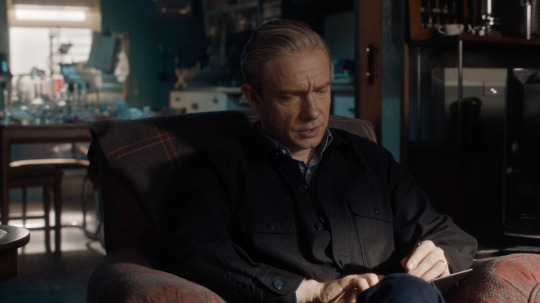
Watson admits the reason he has to do this back in TAB:
“Some are still too sensitive to recount, whilst others are too recent in the minds of the public.”
At the end of the story, Sherlock will ask to make sure that Watson modified the story, to “put it down as one of my rare failures, of course?” The story was progressing like a normal adventure until Sir Eustace’s murder, and then the entire second half of the story was omitted. Sherlock helped Lady Carmichael get away with murdering her husband. He broke his vow, it’s one of his “rare failures”. Sherlock is imagining their marriage in order to try to predict what would happen in the near future and what danger John would be in.
Mary is the case and she becomes the case the next episode. It’s at this point in TAB that we see a shot of the knife in the mantle – connecting to TLD when Mary’s case, the message tied to the dagger, or the case on how to save John, is the one Sherlock still hasn’t solved. The knife is still there in the fake ending of TFP. John thinks he still hasn’t solved it and that’s why he was shot at the end of TLD.
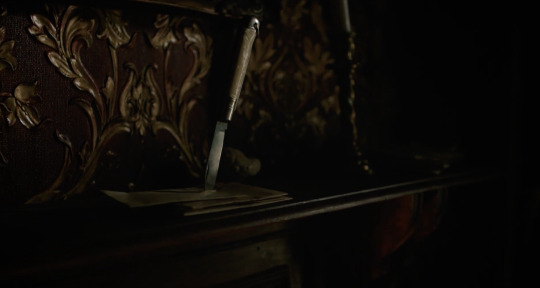
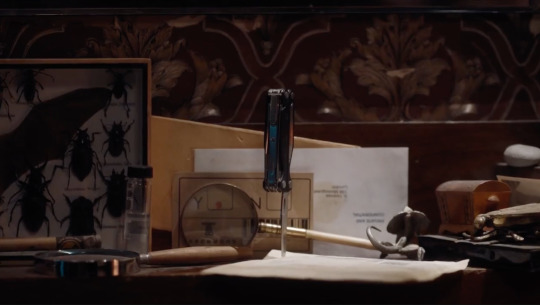
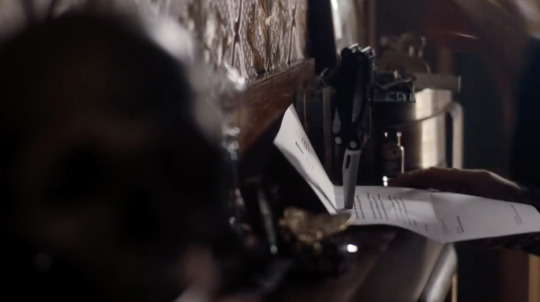
Mary is Sir Eustace with the dark past coming back to haunt her. Mary is the post-humous revenge Sherlock alluded to, the vengeful bride who faked her death to kill her husband, the figure of Death in the Samarra story, and half the ultimate villain – but some cases are still too sensitive to properly recount. Moriarty isn’t back. No, no, no. He’s definitely dead. He planned his revenge on Sherlock five years ago by filming a bunch of reaction gifs and jiving against the glass with Eurus like a snake.
The next episode, Mary’s past comes back to haunt her, and Sherlock breaks his vow. One of his “rare failures”. The over-eager shooter is hauled away as the projector lights the back of her head.
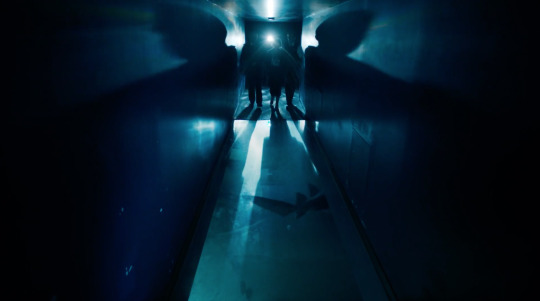
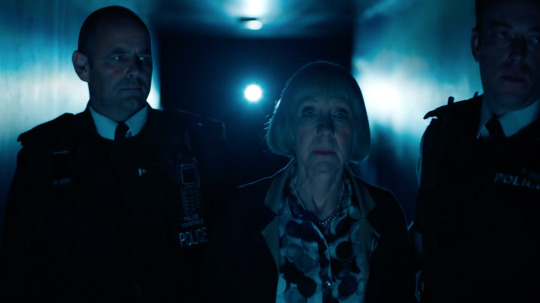
Mary’s death isn’t the only case that John covers up, however. He manages to do that relatively consistently. Even with how on the nose it is, the audience was convinced. The most convincing case is the one that John doesn’t show at all; the cover-up of his own death.
In TST, it’s clear this is about getting away with murder:
That is now the official version, the version anyone we want to will see.
No need to go to the trouble of getting some sort of official pardon.
Lady Carmichael doesn’t have to bother with a pardon and neither does John. His cover-up story, The Final Problem, is an entirely invented entry in the great Sherlock saga, using the name of a real one as a red herring, ending their story and establishing normalcy so no one will know what happened to him next. Series 4 is what happened, officially. But it’s not the truth. John has modified the truth. The romance has been suppressed.
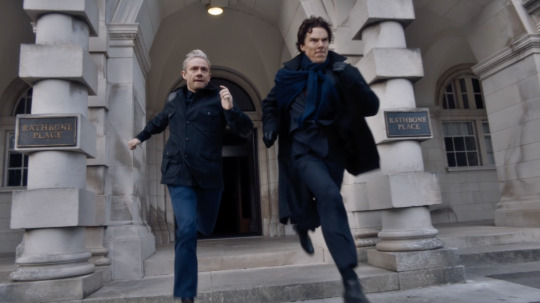

John can’t tell that story because he has to make it convincing enough to draw Mary into the open; he doesn’t want to go to the trouble of getting a pardon when he has to face her again. This has to be the version everyone believes so that when it’s revealed that John committed suicide, everyone believes that too.
John has let his insecurities, self-hatred, and suicidal ideation leak into the subtext of series 4, so that when the news gets out about what really happened, and that the last story in particular was a total fabrication, people believe the secret story hidden beneath the true one. Suddenly the decline of hi stories becomes the tragic tale of a man losing his way and taking his lie. The story ends on a low note. “It’s gone a bit downhill, hasn’t it?” And it is emotionally true, but it’s all part of John’s bigger plan to fake his death.
When Eurus as Faith gives Sherlock the note about Culverton Smith she writes one story on the surface, the one that Sherlock deduces, but hides another message underneath that he doesn’t see until it’s too late. This is the case he didn’t solve.
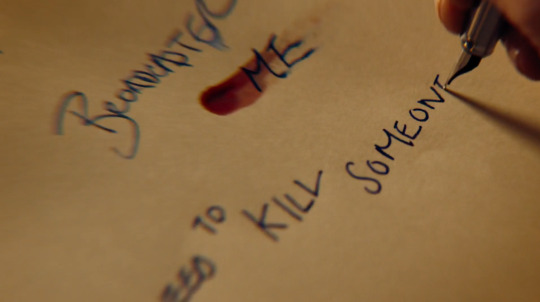
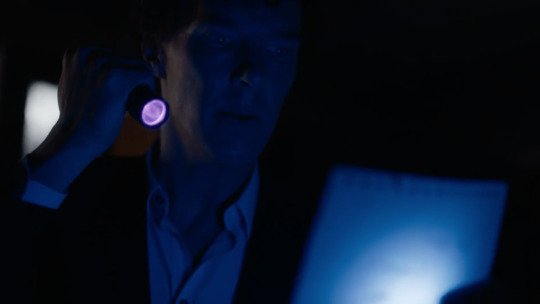
This is what John’s story is: one text subsumed by another bubbling just beneath its surface. When John’s original story falls through because of what happened at the end of TLD, darkness completely overwhelms his story in TFP. Sherlock is drowning in it until he ties a nice bow on the ending. One coverup hiding another coverup. That’s how you sell a big lie; you wrap it in the truth to make it more palatable.
One of John’s blog entries has a picture of the knife stabbed into a clue board. Sherlock figured out that the victim faked his own death.
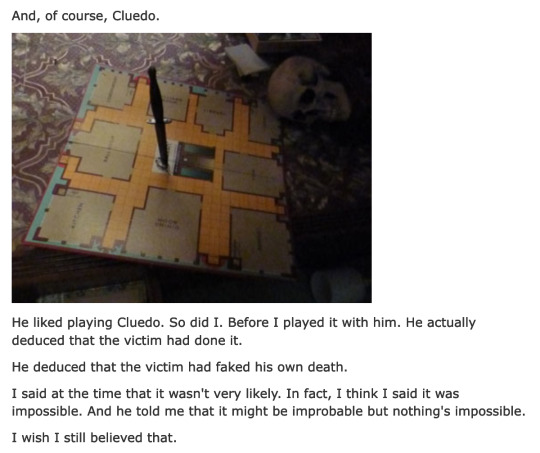
TAB foreshadows the lengths John goes to:
But in all our many adventures together, no case pushed my friend to such mental and physical extremes as that of The Abominable Bride!"
Sherlock is pushed all the way to the predestined end of the story, clinging to life at the Reichenbach Falls with Moriarty punching him down. It’s only when he decides to let John in emotionally that he appears, foiling him easily, kicking over the falls like he isn’t a threat at all. Because he isn’t when they’re together and they openly love each other.
John doesn’t have the same confidence. John thinks that he can’t avoid Samarra – that even if he fakes his death, that happy ending he invents at the ending of TFP is the closest to happiness that he’s ever going to get. Sherlock has more confidence in John and what they can accomplish together. “I’m a storyteller. I know when I’m in one.” The real John knows it too, but he can’t see the same ending Sherlock does if he still doesn’t know Sherlock loves him back. John’s ending is a dark mirror and denial of Sherlock’s hopeful vision.
Nothing has pushed John to such mental and physical extremes as that of the abominable bride. Mary faking her death, returning to manipulate and gaslight him, and trying to get him to commit suicide to burn Sherlock’s heart out of him forever is the worst thing that John’s ever been through. The most trying case in his career working with Sherlock. Faking his death, however, isn’t the end. Because the whole point in all of this is to outsmart Mary and Moriarty, drawing them into the open so John can make his move.
Smallwood: “You're off the hook, Mr Holmes. You're home and dry.”
Sherlock: “OK, cheers.”
Smallwood: “Obviously, there's unfinished business. Moriarty?”
For Sherlock, his unfinished business is Moriarty. For John, it’s Mary. They’re going to have to work together to finally defeat them once and for all – and they can only do that once they both know the truth. Nothing can stop them. Then the spoke will turn, and the world will have something new.
But for now, the truth has to be modified. The romance has to be suppressed. Until the world is convinced John is dead and he’s in the clear.
“That’s not what happened at all.”
“It is now.”
#sherlockedit#tjlcedit#johnlockedit#sherlock bbc#tjlc#john watson#sherlock holmes#mary morstan#vivian norbury#meta#the abominable bride#the six thatchers#edits#gifset#gifs#looking closer at tab timeline#television#john's blog#series 4
90 notes
·
View notes
Note
Hello, sorry to bother you again, but I have a question that I hope you can help me with. Why did John blame Sherlock for Mary's death? He wasn't even in the room when she was shot, yet he immediately blamed Sherlock. I really can't make any sense of it. It drives me nuts that John put Sherlock through so much pain, by verbally and physically abusing him (oftentimes publicly), for something he actually tried to prevent! Do you have any ideas on this? Thanks for your time ❤️
Hey, ask away! I’m always pleased when someone wants to know my opinion on something, haha! :)
It’s a realllllly twisted bit of reaction, honestly! His rationale at the time was that Sherlock had made a vow to keep all three of them safe (John, Mary, and Rosie), and since Mary was dead, Sherlock had failed him. Sherlock was all too willing to accept the blame because he’d goaded Vivian Norbury, but that in no way makes him responsible for her having pulled the trigger or Mary having magically defied physics (don’t all Mary Sue’s have super powers??) and jumped in front of the bullet, though. It was an ugly choice on John’s part.
That said, I also think that John was hugely compromised at the time. It obviously wasn’t a thought-out, rational decision on his part. Here’s a man whom life has betrayed over and over and over again. Thanks to Moftiss, who were so busy inventing non-canonical extra siblings for Sherlock (and they really, really could have just... not) that they didn’t bother giving us any of the other reasons for John’s pre-existing trust issues, as of before he even met Sherlock. All we know is that he wasn’t at all close to his parents, as they weren’t at his wedding and appear not to have been in the picture enough for him to have contacted them after his return from a literal war zone, that his own sister didn’t even bother showing up for his wedding, and then add in PTSD on top of it. He also had a superior officer that he’d looked up to (at the very least) and who had just as clearly let him down after his own disgrace, so cancel out another potential father/authority figure there, too. Now add that:
his best friend commits suicide in front of him. He didn’t know that Sherlock had been blackmailed into doing it, that it saved his life, that he had to be kept in the dark for his own safety, that Sherlock, for all of his facetious façade, didn’t want to do that to him (I mean, he cried at the time!), but for John, that’s what the experience was: he was forced to watch someone he cared about intensely commit suicide and die before his very eyes, then find out two years later that he’d been alive the whole time and hadn’t thought to let him know until then. Of course he’d have been angry, and justifiably so. I would also argue that this wasn’t in any way Sherlock’s fault - but John’s feelings about it are still totally valid.
his wife lies to him about absolutely everything from her name on up. She dies without him ever learning her real name - because you can bet that she wouldn’t have used her legal, actual name for anything she did as a part of the AGRA team, that’s for damned sure!!
he obviously went back to her out of a sense of duty, maybe to his marriage vows, almost certainly because of his kid, and I say obviously here because he just as obviously wasn’t happy. John is someone who values loyalty, or else trust wouldn’t even be a thing for him. Trust and loyalty go hand-in-hand, and here’s John Watson, of all people, contemplating starting an affair! That’s how bad things had gotten for him. He wouldn’t have done anything of the sort had he been emotionally healthy and in a good position, which he wasn’t. No one was paying him any attention - Sherlock was obsessed with figuring out the “Moriarty” thing, Mary was busy taking John’s place when she wasn’t literally running away, and there’s John, stuck at home and hating his life choices and desperate to break out in any way. It hurt to watch it. :/
he knew that Mary would run when Sherlock offered to help her. That’s canon: it was his idea to put the tracker on the USB key. That’s how little he trusted her by that point. And his lack of trust in her was proven to be spot-on: she attacked Sherlock (again) and ran.
then Mary dies right after he’s told her straight to her face that he used to like her, which means he doesn’t anymore.
So: guilt. Massive guilt. It’s ugly, but what he did was go “I can’t handle this no no no no no” and shoved it onto Sherlock instead, because people do stuff like this around death: find someone to blame. If he hadn’t put it onto Sherlock, it would have meant having to face how he’d behaved toward Mary (almost cheated on her, told her he didn’t even like her anymore) and how much of a failure that marriage turned out to be, which gives a lot of people a sense of personal failure, too, and by this point John just couldn’t deal anymore. So he chose the most convenient scapegoat and it just happened to be Sherlock, who had made a vow that Vivian Norbury and Mary Morstan prevented him from being able to keep. It wasn’t his fault and John knew it right then. He just couldn’t deal. He’s never been good at processing his feelings (British, male, soldier, repressed sexuality... great combo!) and this was a crisis. It was an ugly way to behave, but pretty understandable, I think.
By the end of TLD, he’d improved a little bit, and yet he was still contorting things bizarrely. The “Mary” he was seeing was nothing like her actual self. He was trying to colour his memories of her backwards, making her better than she had been. People do that in their grief, because accepting the dead person’s faults hurts, too. He even gave her credit for his own cleverness, in figuring Sherlock out. Even his own version of Mary - aka himself - tells John that he’s talking to himself. He knows he is. He surely also knew that everything he said about Mary at the end of TLD was actually true of Sherlock, not of Mary. Sherlock is the person who’s always thought that the sun shone out of John’s ass and face and everywhere else, that he’s the best and bravest and kindest and all of that - when John demonstrably isn’t - he can be, but he definitely isn’t all of those things all of the time! But it’s Sherlock who’s always brought those things out in him, given him opportunities to be a hero, be better than he is, and it’s always been Sherlock who believed all of that about him.
Mary questioned him, second-guessed him, flatly contradicted him. She didn’t build him up and she certainly didn’t think of him in those superlative terms that Sherlock does. John surely knows that, somewhere on the same level that he knew that Sherlock had nothing to do with Mary’s death. But he’s not ready to acknowledge it just yet. John has deep-running emotional problems and needs shit tons of therapy, far more than anyone else on the show. He’s not a bad person, but he made some really ugly decisions in his pain and his lack of knowledge of how to deal with what he was feeling and experiencing. It’s painful, and poor Sherlock took the brunt of it - quite willingly, unfortunately. That’s another whole discussion (we need to have a self-care chat, Sherlock!!), but I still stand by my position that these two damaged, dysfunctional people can fit together uniquely well, that their dysfunction can be healed in one another, that they make each other better versions of themselves. Series 4 showed them at their lowest and least functional, though. They were at their most miserable when they were at their most separate.
That’s probably a longer answer than you wanted, but it’s a damned good question and warranted a proper response!
96 notes
·
View notes